#and he laments that he was born in the wrong era
Text
Eobard treating our era the same way that we treat the late 1500's and early 1600's amuses me way too much.
He would absolutely have some unexpected depth of knowledge about pop culture even before getting powers. He would know, for example, how to use the word 'meme' and 'shitpost' in a sentence correctly. He would use these words in the same way that you hear modern archeologists and anthropologists and historians talking about Shakespeare's vernacular.
#also yes he 100% thinks everyone is delightfully backwards about some things#and he laments that he was born in the wrong era#eobard thawne#the reverse flash#reverse flash#professor zoom#zippy thot
50 notes
·
View notes
Note
🔥 each member of vox machina
Vax: really the sadboy narrative for Liam has always been stupid but it's egregiously bad that it started with Vax, who is like, sad for maybe a fifth of the episodes and largely because Liam O'Brien's actual mother was dying, like, with all due respect what the actual fuck, fandom.
Vex: I am the founding and probably only member of the "Vex is my favorite character and also I am 100% cool with Colville's depiction of her." The generosity she shows even very early on in C1 is still a generosity borne of some degree of security - they have a keep by then - and I also just don't think you have to like a character to write them fairly. Granted it's been a minute since I read early VMO but nothing stood out to me as out of line with my understanding of Vex.
Pike: repeating myself once again but I like Pike a lot and wish we could have seen more, but because we didn't, people who say she's their favorite in C1 do tend to turn me off in that I feel they're looking for a relatively flat and widely praised character to project onto rather than a character who goes through more messy development.
Grog: I think he's often underestimated and I was guilty of doing so myself, to be honest, until I saw Travis play more and until I personally got better at D&D. Also I still maintain that playing INT 6 sensitively and well is infinitely harder than playing INT 16, all things considered, and this is yet another reason why people should play high INT more often.
Scanlan: Also underestimated; I do understand being turned off by the whole extremely horny playboy thing but as I've said before Bard's Lament is a major litmus test for me: if you think Scanlan is completely at fault here, you are wrong, and if you think he's not partially at fault, you are also wrong.
Tary: I genuinely love him and think he's a great character and one of Sam's best, but while his character arc is strong the Taryon Darrington Arc of the VM Campaign, through no fault of his own (and partly bc I personally think D&D Hell, especially pre-Descent Into Avernus publication, is kind of boring), is one of the weakest parts of the campaign because it's kind of a grab bag of loose ends. With that said I would happily watch more Darrington Brigade-one shots.
Percy: Percy is also generally a litmus test in that it's like. Is he a good person? Eventually I believe he becomes one, and even before that I think he's very sympathetic and deeply traumatized and like, 24, so I get it, but also, who the fuck cares. This ties into the Essek and the Ashton opinions and all kinds of other stuff but why are people so invested in fucking absolving their blorbo of all sins? I want someone who's lived enough of a life to have done some heinous shit because that's fun and interesting and it's pretend and also because then they can have a rewarding character arc by either working towards redemption or coming to terms with who they are or spiraling into tragedy.
Keyleth: I like Keyleth a lot but I am, as this post indicates, far more sympathetic to Vex, and so while I do think Keyleth is a fairly good person she is also extremely sheltered and naive and terrified of doing the wrong thing and I would have, like Vex, wanted to scream at her half the time were I just a random NPC wandering about the campaign. On the other hand C3-era Keyleth? fantastic no notes she has grown up in such an interesting way.
Tiberius: I think we, and by we I mean people capable of separating the art from the artist, can recognize that his concept actually fucking slapped and unfortunately he was played by someone who absolutely sucked in a myriad of ways. I would love to see the alternate universe in which the same general concept (prodigy sorcerer from Draconia who is full of themself) had to face not just the destruction of their civilization but the realization that they were taking advantage of the Ravenites and while they did not deserve to be killed by Vorugal, had done nothing to justify aid from those they had subjugated either. Like, the alternate world in which one of the current cast members or like, a close friend of the main cast (Ashly, Erika, Mary Elizabeth) played this is one I'd love to see.
64 notes
·
View notes
Text
In her 1996 novel, Fieldwork in Ukrainian Sex, Oksana Zabuzhko wrote that for Ukrainians, “Fear was passed on in the genes.” Zabuzhko, one of the most important living Ukrainian writers, was referring to the childhood fear of saying the wrong thing to the wrong person in the Soviet era. Anyone who approached you could be spying for the KGB, and if you let a careless word slip, the bad men would come “and put Daddy in prison.” But that line captures what Zabuzhko’s novel is about: the inherited fear of oblivion born between the hungry jaws of empire, or what she calls the “eternal Ukrainian curse of nonexistence.”
Fieldwork in Ukrainian Sex was a sensation when it was published in Ukraine, but it took 15 years for it to be translated to English. Even then, it didn’t find a U.S. readership until the full-scale Russian invasion in 2022. The book’s path is emblematic of the tough road to English translation, much less readership, for novels written in Ukrainian. Until this year, not a single novel translated from Ukrainian had been published by a major U.S. publisher.
Tanja Maljartschuk’s Forgottenness, the first to break that barrier, is a book about Ukrainian identity and the struggle against nonexistence. Originally published in 2016, when it won the BBC’s Ukrainian Book of the Year Award, it tells the story of a contemporary Ukrainian writer who becomes obsessed with Viacheslav Lypynskyi, an important Polish figure in the early 20th-century Ukrainian independence movement. Lypynskyi studied Ukrainian at university in the early 1900s, when teaching the language was scandalous; both Russians and Poles considered it “a dialect of either Russian or Polish, or both concurrently.” Printing Ukrainian works was also prohibited, “punishable by imprisonment or exile.”
Throughout history, Ukrainians have faced this paradox: a denial of their existence (Ukrainian isn’t a language) combined with brutal repression (and you are forbidden to speak it). As Maljartschuk writes, the struggle makes many “lose their minds.”
Forgottenness is full of characters shrugging, often in dramatic situations. While American critics often lament shrugs (along with nods and smiles) as lazy dialogue tags, for the Ukrainian writer, the shrug is an important gesture. Soviet-born U.S. writer Gary Shteyngart once wrote, somewhat tongue-in-cheek, that Ukraine’s coat of arms could be a man shrugging. This attitude can easily be mistaken for nihilism, but it is far more complex than that. On its most basic level, it comes from a learned acceptance that many situations are beyond one’s control. For generations of Ukrainians, this acceptance has been necessary to maintain sanity.
Ukrainians have found different ways of shrugging. In Forgottenness, the unnamed narrator remembers how her father, like many Ukrainian men of his generation, became immersed in kung fu in the 1980s, needing to feel like he could protect himself. Her grandfather, after feigning insanity to avoid military service, worked as a forced laborer, melting down church bells that were transported across the Soviet Union to be made into weapons; for years, he responded to most things with a joke, fueling himself on laughter.
She remembers how her grandmother was left at an orphanage by a father who would soon die in the Holodomor, Joseph Stalin’s terror famine of 1932-33, during which millions of Ukrainians starved to death. In an attempt to understand and connect with her family, the narrator asks her mother how this genealogy of suffering affected her. “Mom shrugged. ‘What was there to be affected by? That’s how things were, and that’s all there is to it.’”
The narrator has the opposite reaction. Her fascination with Lypynskyi, who almost lost his mind, falling into infirmity under the weight of defending the idea of a Ukrainian nation, comes partly from identifying with him. For the narrator, her inability to shrug leads to an existential crisis. She becomes terrified of the outside world. For months, she stops going outside. She begins to mop her floor relentlessly. She stands on her head to see things from a different perspective. She obsessively reads old newspapers in search of references to Lypynskyi. She is desperate to understand history. In a recurring image of the novel, she imagines time as a blue whale eating plankton by the millions. There is no mystery as to whom the plankton represent.
The historical parts of Forgottenness can be challenging, both to follow and to witness, for the simple reason that Ukrainian history is challenging. Lypynskyi lived through the early 20th century, a time when hope for a Ukrainian nation flickered before being brutally smothered.
As the narrator puts it, in the three years after the Russian Revolution, “Kyiv, like a loose woman, changed hands over ten times … and each new seizure ended in bloody purges.” Borders change, names change, empires come, empires go, and everyone dies. One reason that Maljartschuk’s is the first Ukrainian-language novel to break into U.S. commercial publishing is that so many Ukrainian writers from the 20th century were permanently silenced.
As Ukrainian writer Anastasia Levkova recently wrote, under Stalin, 500 of the foremost Ukrainian writers were executed. But she is quick to point out that Stalin was not solely responsible for silencing Ukrainian literature: For example, Vasyl Stus, one of the most famous Ukrainian poets of the 20th century, died in a Soviet forced labor camp decades after Stalin’s death. It is not just Stalin, nor is it just current Russian President Vladimir Putin—it is the Russian Empire that denies Ukrainian history, Ukrainian language, and Ukrainian existence.
Ukraine, one character in Forgottenness laments, “has so many million bodies but so few actual people.” The Russian Empire won’t even allow remembrance of the bodies. When the narrator goes to visit Lypynskyi’s grave, she cannot find it, because the cemetery’s headstones were bulldozed and used to line the floors of pigsties during collectivization. How is she to come to terms with her past when the empire has erased it?
As she’s fighting panic attacks, the narrator watches pigeons across the street building nests and laying eggs on neglected balconies. “Once in a while, the building’s owners would toss the eggs off the balconies onto the asphalt below. The pigeons would then sit on the roof and dispassionately observe the destruction of their offspring.” The pigeons shrug not because they don’t care, but because—what choice do they have?
The narrator’s inability to be like the pigeons almost kills her. But she can still think, write, and face her crisis head-on. In what might seem like an anti-climax, but is actually a triumph, she seeks out a therapist. As she puts it, in her part of the world, “the human head has one purpose—to eat.” Her mother condemns her for being a drama queen. But the narrator finds another woman, a professional, who listens and who cares. She begins to trust her. She starts talking her way out. Through language and solidarity with a fellow Ukrainian, she finds her way back to the world.
Maljartschuk, a Vienna-based Ukrainian novelist, wrote Forgottenness between the Maidan Revolution in 2014 and the full-scale Russian invasion of 2022, a period when Ukrainian art, newly liberated from colonial shackles, was blossoming. Its Ukrainian title, Zabuttya, means both “forgetfulness” and “oblivion,” and although this is not a novel about the war, no event has brought the threat of oblivion into more urgent focus than Russia’s invasion.
According to Forgottenness’ promotional materials, Norton’s inspiration for publishing the book was a March 2022 article in the New York Times about the urgency of bringing Ukrainian literature to the West after Russia’s invasion. Because of the sudden prominence of Ukraine in the American consciousness, there is the temptation for Americans to read Ukrainian literature today anthropologically, approaching it as a window into the country instead of an imaginary story about Ukrainian characters.
To be clear, this is not a criticism of the publisher: I am very grateful that Norton published Forgottenness, and I hope that more U.S. publishers will follow its lead. But how does it affect the reader’s experience to approach the book with images of rubble in mind? How does an American reader get around the trap of reading Ukrainian fiction like it’s nonfiction—of reading it for information rather than emotion—when current events are the reason for its translation into English? The narrator’s panic attacks are brought on not by missiles but by the chaos in her mind and the fear in her genes. Is it not disrespectful to read the book as a guide to understanding Ukraine in 2024?
Fortunately, Forgottenness shares a way to read itself and also to read Ukraine’s latest fight for survival. Maljartschuk personifies the statewide struggle against oblivion in the individual struggle to accept the things you can’t change while refusing to accept the things you can. The struggle, I believe, applies to both the narrator and Ukraine, past and present. The story speaks to what came immediately before the book was published: the Maidan Revolution, in which Ukrainians from every class and background risked their lives to drive out the pro-Russian puppet government, holding Independence Square in Kyiv for three months in the face of a harsh winter, police snipers, government-hired thugs, kidnappings, and torture. But Forgottenness can also speak to what will come after.
The narrator says of her grandfather feigning madness to get out of fighting: “Between a slavish existence and a heroic death, he chose the former, and only thanks to this choice did I become possible.” In her words, she is “the offspring of meekness in the face of power and fear in the face of death.”
But there is no trace of meekness in today’s Ukraine. A generation of Ukrainian writers and artists are now on the front lines of battle or in the rear guard, tirelessly fundraising for equipment for soldiers.
“Everything I’ve done in my life has only come to be by overcoming great fear,” Maljartschuk said in an interview following the 2022 invasion. Fear, as Zabuzhko wrote, lives in the genes. But fear need not paralyze. “Ukrainians are no longer victims,” Maljartschuk added, “but fighters.”
24 notes
·
View notes
Text
GrimmNell: from the crack-ship to the “calming influence”
Well, why do I ship GrimmNell? If someone asked me this question 10 years ago I would simply say - well, they both are hot and look aesthetically pleasant together. A valid argument, isn't it? But like every shipper deep inside I was craving for more - trying to find any crumbs to cross “just a crack-ship” territory. It wasn't easy. It still isn't actually - even though the last years of Bleach era blessed us with some interesting interactions. That's why I decided to write this meta - let's see what changed and highlight the best of GrimmNell's dynamic.
Manga
Arrancar Arc
Like I said - being a GrimmNell shipper before 2015 was pretty rough. They literally had only one small interaction and oh well... Grimmjow was a typical Grimmjow and Nel was in her child-form. But bold of you to assume that this short manga moment wasn't overanalyzed either.

So yeah, let’s start with a bare minimum - Grimmjow didn't kick Nel. I wish I could say that stomping on a kid is too petty for a mighty Espada, but cough Nnoitora exists.
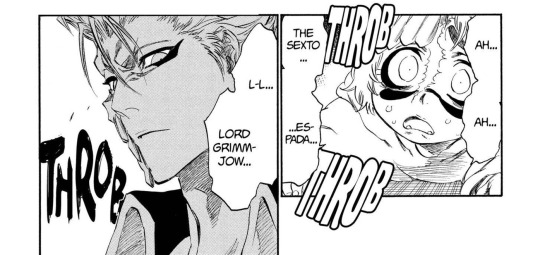
Even though Nel lost her memory, she recognized Grimmjow immediately. Was he so famous in the Hueco Mundo's deserts? Did Peshe and Dondochakka warn her about him? Or maybe Grimmjow's face alone was enough to trigger Nel's memories? In any case - this panel born many theories and headcanons about their possible previous interactions.
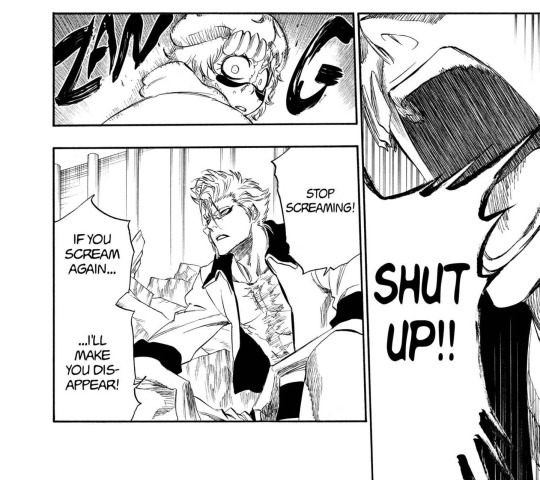
However, it's hard to say that Grimmjow was super nice to her. Nel kept blaming herself and her loud cry over Ichigo's body made Grimm lose his temper, to be fair it sounded really annoying in the anime. Threatening mod was activated.
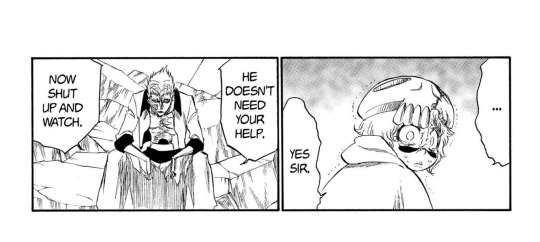
Funnily enough, the next thing Grimmjow did - was basically comforting her. In a very Grimmjow-way though. He confirmed that Ichigo (the object of Nel's lamentation) will be fine, there's no need to struggle and she just has to wait in silence. Considering that Grimmjow was in hurry and very frustrated (his convos with Ichigo and Orihime are full of “urusai”), he solved the deal with Nel rather nicely. Once again - no violence included, despite his harsh words, he never hurt her.
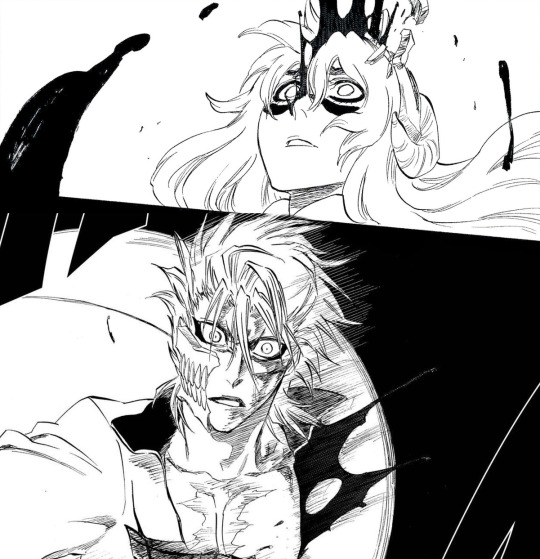
Was it enough to sail the ship? Of course not... Yeah, they got some parallels in manga (like- getting a scar from Nnoitora's sneak attack) and were left in Hueco Mundo without a proper conclusion (at least barely anyone believed that they died off-screen). Even though “let’s ship the last Espadas alive” argument was strong - GrimmNell still lacked the proper interactions. The fans had no choice but headcanon their dynamic based on one scene and well - remember the submissive Nelliel around the bad boy Grimmjow? Ah, so good to be so wrong.
TYBW
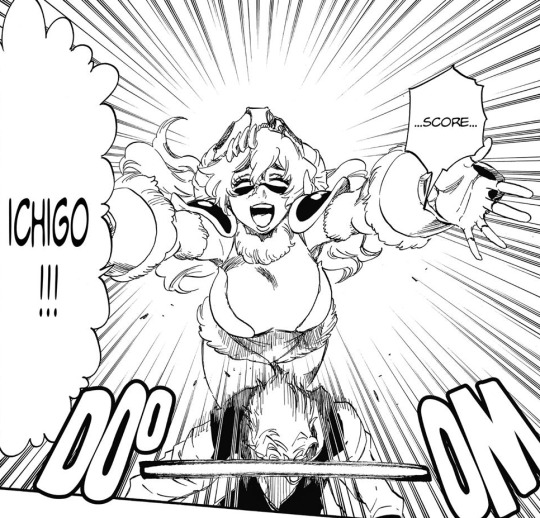
GrimmNell comeback was a real feast for the shippers. Both characters appeared again, Nel was in her adult form, she and Grimmjow were staying side by side and they talked! Finally, manga gave a decent hint on their dynamic and it didn't disappoint.

Firstly, GrimmNell demonstrated a great comedy duo's potential. Grimmjow's cool re-introduction was cut by a happy Nel who jumped on Ichigo immediately. The battle tension dropped and Grimmjow hurried up to call her out for messing with his vendetta. The first nod to the established dynamic between them - he was using her name instead of calling her “woman”, “brat” or whatever.

And suddenly the atmosphere changed. Nelliel returned to her Espada-self. To be precise, to her self-proclaimed mission - to keep Grimmjow in check (more about it in the novel's analysis). It's obvious, that she isn't afraid of him and directly says who is the boss here.
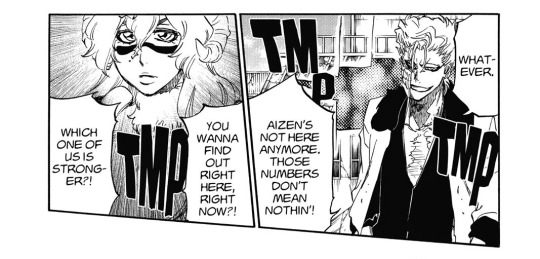
Grimmjow isn't a type who likes to be bossed around though. Remember, he is the king; he already had a hard time following all Aizen's demands. However, he just smirked at Nel's remarks, giving her a valid argument. Looks like she is a solid opponent in his book and their fight over the dominance is a quite exciting challenge for him.

The tone of their confrontation wasn't antagonistic though. Even though Nel wanted to stay in control, even though Grimmjow reminded her that he got teeth to bite her back, their interactions didn't cross a bitter line. The very next (and sadly last) moment they shared proved that they don't hold any grudges against each other: Nelliel quickly understood what's going on inside his head and tried to warn him, expressing a genuine concern. Meanwhile the independent arrancar cared enough to look back at her establishing his decision.
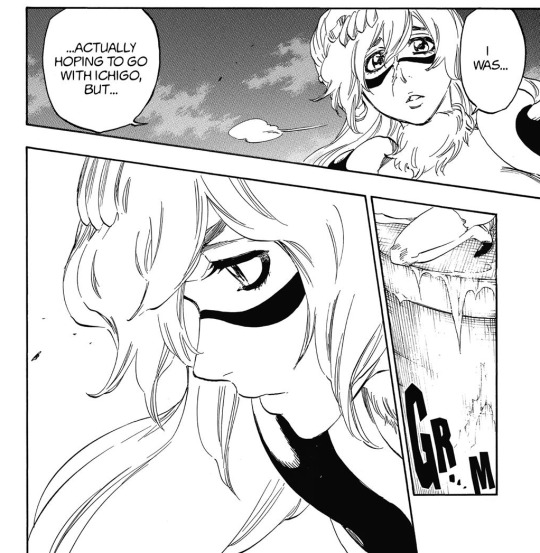
The last manga arc once again left the arrancar duo without a clear ending. They didn't even get their own full-fledged fights hopefully the coming anime will fix it. All we knew - Grimmjow was about to bite the dust, but Nel was here to save the day. Both followed Urahara's keikaku, that's why their chances to survive were high enough. However, the epilogue didn't even mention them, leaving their fans rather worried. Good thing - just one year later the first volume of the CFYOW novel was released - and the new era of GrimmNell's renaissance began.
Novel
But the novels weren’t written by Kubo himself! Did they even count as a canon evidence? - A valid question. So, Kubo-sensei, answer this one, please!

Yeah, even though the portrayal was left up to the writers, I highly doubt they would really contradict Kubo’s characters writing. But to be sure - let's summarize the GrimmNell manga crumbs to compare them with their novel's development.
Nelliel thinks that Grimmjow is her responsibility and tries her best to keep him in check.
Even though Grimmjow isn't a fan of gatekeeping, he doesn't ignore Nel and elaborates his decisions for her.
Nelliel’s concern is not just about damage Grimmjow is able to cause. She also cares about him personally.
Starting with the first point, oh well, that's the bone of their novel's dynamic.
Sorry for a mix of two translations - credits to VIZ for the official one and to MissStormCaller for the fan one
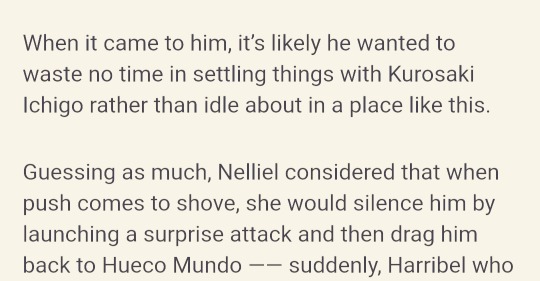
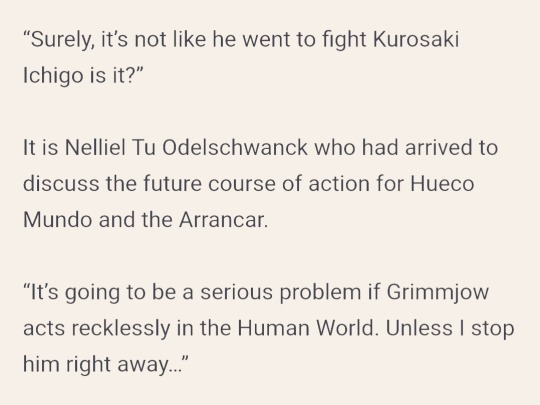
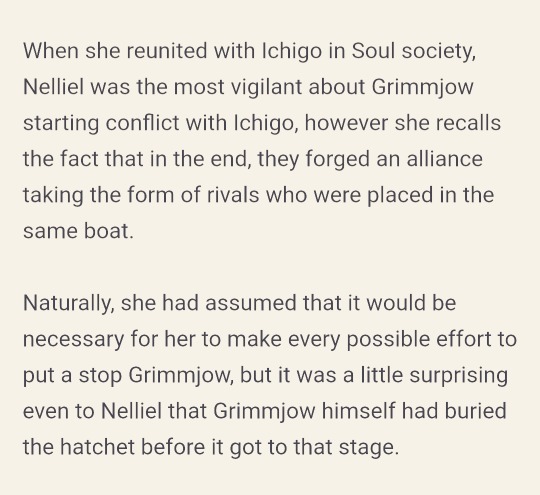
Stopping Grimmjow from doing anything reckless - is Nelliel's holy mission at this point. Nobody asked her to, but even when the war was over - she continued to keep an eye on him. Besides, Nel never doubted that she is capable to stop the Sexta. Compared to Halibel, who is very careful around Grimmjow and thinks that a fight with him would cost her too much - Nelliel's direct approach is hard to miss. “Dragging him back to Hueco Mundo” is something she sees as a not big deal. So it's up to you to decide - if Nel is just too confident in her power or she has her own reasons to believe that Grimmjow wouldn't "sink his fangs" into her body.

The brute force isn't Nel's favorite weapon though. She only hit Grimmjow with a mini-bala once (at this point «Nel is here to ruin Grimm's menacing aura» became Bleach's running joke), just to catch his attention. She doesn’t mention the Espada’s numbers hierarchy as well. Instead, Nelliel tries to convince Grimmjow, to prove why his actions aren't right.

As you see - Nel is smart, she is talking his language and actually uses Grimmjow's code of honor against him. He refused to fight Ichigo when the shinigami was wounded. The victory doesn't taste good if his opponent has a solid excuse to lose. The cold shower from Nel works, but Grimmjow doesn't give up easily. Actually he kinda calls her out as well.
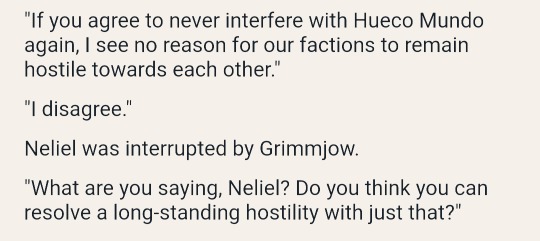
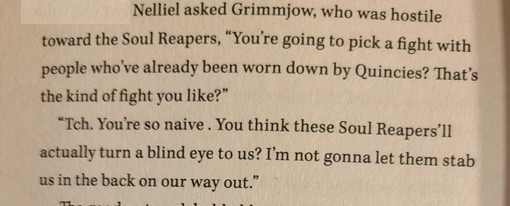
Back in the past Nelliel almost lost everything, because she didn't foresee such a cruel betrayal from Nnoitora. Unlike her, Grimmjow doesn't trust easily and expects the worst outcome. Nel's pacifism is something he barely understands. But if she choose to stay naive, he is here to fix it. Actually, moments like these show that Grimm draws his sword not just for fun, he is pretty protective of their group even though he hides it behind his rude words.

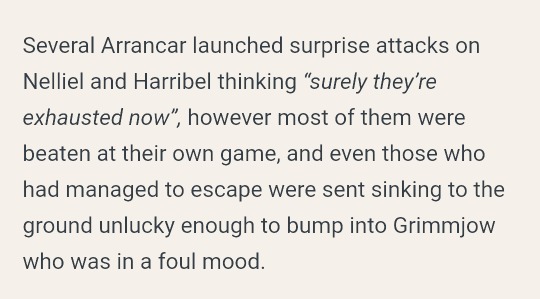
Despite their different life positions, Grimmjow joined Nel in her quest to save Halibel. He didn't show much respect to Tier, but he didn't leave Nelliel with her alone either. The Sexta hates to stay indebted to anyone - so his cooperation could be a way to pay Nel back for saving his life.

Both of them perfectly remember Askin's episode and Nelliel doesn't miss an opportunity to mention the case as a solid proof that it's better to listen to her. Even though Grimmjow clearly isn’t happy, that someone is here to remind him of his failures - it works again and cools him down.

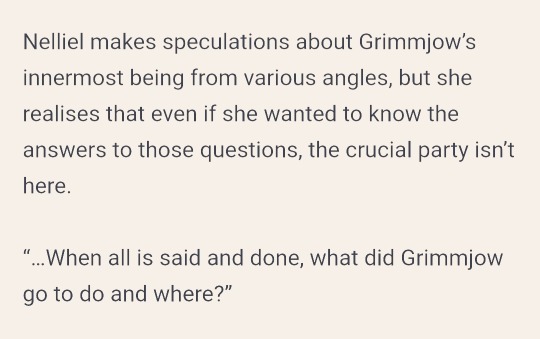
As you might have noticed - Nel acts like Grimmjow's voice of reason, shouting down his killing instincts. Half a year passed and she is already better at it - instead of forcing him to do something, she tries to find a key to his behavior. The novel establishes that Nelliel really put some efforts to get his way of thinking. Her opinion about him is slowly changing as well - if at first Grimmjow was an unpredictable subject to her, later she noticed some patterns (like his love for a fair fight) and was pleasantly surprised that he is able to overcome his thirst for blood, at least for Hueco Mundo's sake. Still not all the things about him are clear to her. Funny, how Halibel tries to explain how Grimm's pride works, while Nel just blames his change of mood. Her naiveté strikes again - and yet Halibel always entrusts the wild Arrancar to her care without a fear.

Maybe Nel's direct nature really helps the case. She doesn't pretend, she isn't afraid to bruise Grimmjow's ego. He isn't a ticking timebomb she guards; Nelliel’s concern about his wounds proves that a genuine bond was already formed. Feeling pretty comfortable around him, she breaks his solitude to offer some help. Grimmjow plays a tough guy as an answer, but doesn't mind her company.
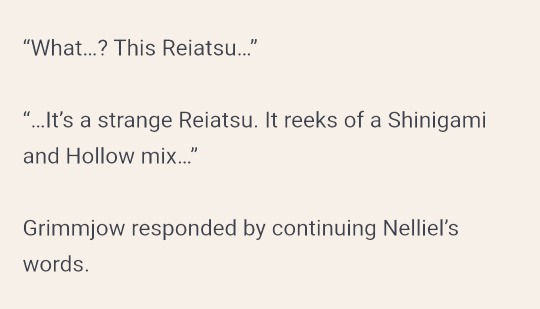

Not to mention, that they communicate rather peacefully, when their opinions don't clash. Even though Grimmjow prefers to keep his distance, he is in sync with Nel most of the time, jokes around her and never ignores her presence in general.

Actually, the novel even hints that Grimmjow takes a certain interest in her. Nelliel dares to boss him around and yet the proud arrancar tolerates her. More to say - her Reiatsu is the first one to pop up in his mind, just after he established that his memory has some strict limits.
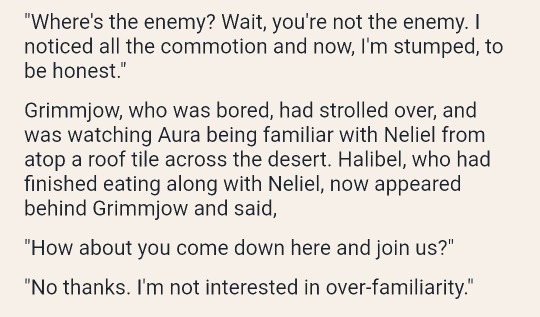
Well, okay, Nelliel was always eager to follow him to interfere in his business; maybe that's why her Reiatsu became unforgettable. But when she finally gave him a break, too busy chatting with Aura, Grimmjow suddenly felt bored, “stumped”. Yeah, no opponents to fight is a big deal for him, the key to his foul mood and yet instead of doing something destructive he preferred to stay and watch Nel being nice to someone else. Of course, he denied Halibel's offer to get close, to join the wholesome party, but his interest alone speaks volumes.

Finally - the "heavy artillery". Grimmjow witnessed many times how Nelliel is all over Ichigo, how protective she is of him. The Sexta seemed to ignore it, only complaining that Nel interrupts his beef with Kurosaki. But when Lil directly asked Grimm if Nelliel is Ichigo's girlfriend, she got a very rigid response. Of course we can assume that Grimmjow was fighting for his OTP aka IchiHime, but let's be serious - the idea of polygamy isn't new to the Arrancars. Why would someone as cynical as Grimmjow care that Kurosaki got more than one girl? Why even bother to answer such a romantic question to begin with? And yet for some reasons it was important for him to destroy IchiNell. The way he compared Nelliel and Orihime is also interesting. Nel can be happy-go-lucky as well, especially when she crushes Itsugo in her hugs. But she is very different with Grimm. Confident, calm, stubborn, sometimes sassy, sometimes caring - looks like Grimmjow prefers to see her that way.
In the end, the novels didn't make GrimmNell canon or anything, but they added more meat on the skeleton Kubo built and left some interesting teasing. We see that the bond between Nel and Grimmjow keeps developing; half a year was enough for them to get much closer than they were in the final arc. The relationship is still rocky though: however, in the novels their banter is much tamer compared to the game version. Wanna see the killing tension? Well, let’s check the Brave Souls as a bonus!
Game
Of course we must keep in mind that the Bleach games are rather canon-ish than canon, so it’s better to take any interactions with a grain of salt. After all, the “The Alternate Rebirth” story was only supervised by Narita (the novel’s writer). So, even if the connection with the CFYOW’s plot is obvious, many details like the cool Beyond Resurrection forms and the dead Espada’s comeback remained as “what if” scenario. However, some things always stay the same - Nelliel's concern about Grimmjow is one of them.

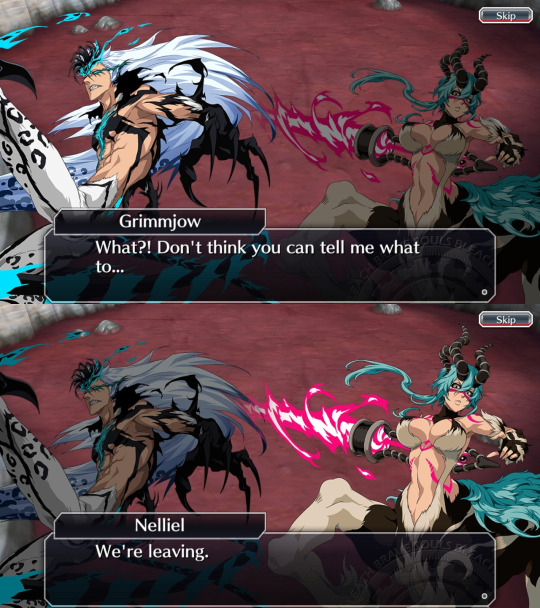
Feeling a suspicious danger Nelliel immediately activated her protective boss mod. But giving Grimmjow a direct order never worked smoothly.


Grimm's anger had no effect on her though, Nelliel still dragged him away from their enemy. His outburst just made her change the tactic, using the voice of reason this time. She still refused to leave his side.

Despite all the threats, the Sexta just run away instead of picking a fight with her. But bold of him was to assume that he can escape Nel's care.


No matter how much Grimmjow pushes her away, Nelliel is desperate to keep him safe. But her way to say that she cares about him obviosly just triggered him more - from his point of view Nel is doubting his strength.
As you see, here their dynamic kinda lacks the understanding they reached in the novel. As if the time had reversed and the lessons they learned (from Nnoitora or Askin) vanished from their memory. Nel is too pushy and Grimm is too hot-tempered, both too stubborn to step down.
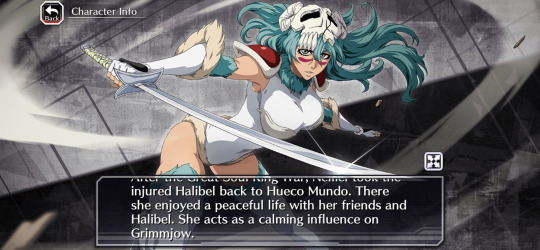
However, the “Brave Souls” also blessed us with another big crumb - Nelliel's TYBW profile establishes that she has a calming influence on Grimmjow. So yeah, even though in the “The Alternate Rebirth” story the Sexta still barely listens to her - it’s nice to see an extra confirmation for something what was very visible in the novels.
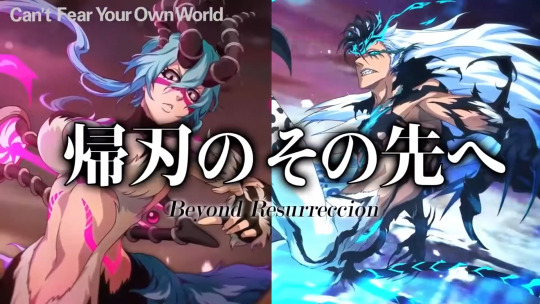
Besides, it's important to mention how the advertising company presented GrimmNell as a paired set. Mr and Ms Arrancar, right, Hikone? The story gives a big focus to their interactions. After all, even when they have disagreements in the end they still team up to fight side by side. them saying Beyond Resurreccion together in the trailer gives me chills
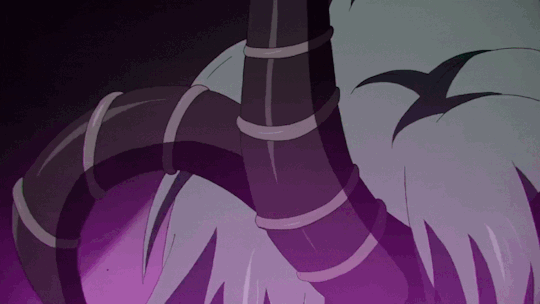
What's left to say? In many ways Grimmjow and Nelliel are polar opposites. Destruction and Lamentation. The one who is eager to fight and the one who wants to keep peace. It's surely not easy for them to cooperate, however they were able to form a quite interesting bond.
Even though Nelliel “is keeping Grimmjow in check”, it's not like she puts a collar around his neck. He wouldn't let anyone steal his freedom again. Grimmjow still argues and yet they discuss things and these conversations make him slowly reconsider his views. The Sexta might act like a lone wolf, but he is clearly getting used to Nel's company.
Nel herself learns too - she always took an interest in dangerous individuals, giving herself a duty to watch over them, to guide them. But this time she considers the other's perspective and is more honest, so Grimmjow can understand - she doesn't look down upon him - even when they disagree - she cares about his well being.
Their progress really warms my heart. Look how far the aesthetic crack-ship has gone! Hopefully, it's not the ceiling and we'll see more of them if Kubo will continue the Hell arc.
Thank you for reading till the end! If I missed something, pls, don't be shy and tell me! I would gladly read more GrimmNell thoughts bс I'm starving haha
151 notes
·
View notes
Text
Hi I really love ur writing!!🥺 I saw that you had a Choso x reader scenario in the artist!JJK au & was wondering if you could write another one?
hello!! can we get another scenario with reader & choso in the artist!jjk au? :D
warnings; none. full artist! universe here.
choso loves to wear your clothes.
it’s not on purpose, he says, but because you have shirts that fit his aesthetic better than yours. because even if your shoe sizes aren’t the same, you conveniently have socks and necklaces and hats that simply look better for choso than they do for you.
and maybe he doesn’t return your things for months on end, but you truly don’t mind, really, if choso needs your button-down with the gold stripes for his date across town. what choso requires, you’re always willing to give, because you know instinctively that choso would do the same for you.
(my date might be cute, choso tells you, solemnly fixing his hair in your bedroom mirror, but it’s imperative i look better than he does.
imperative, you respond, that’s new.
fuck off, choso says. you laugh, and so does he.)
choso is something beyond your best friend – he is your other half, your soulmate, your rock and shield. you reckon you could spend a lifetime with him, getting high and going to thrift stores and watching fast and furious until your eyes bleed. he’s your partner during late nights at the library, your enabler when you’re feeling reckless and texting your pink-haired menace, your date to the grocery store.
choso loves with his whole heart. he doesn’t judge you, doesn’t question, but accepts you with open arms and deceivingly disinterested eyes. he’s cried in your bathtub; you’ve had multiple breakdowns in his. but at the end of the night, you dry each other’s tears, take your vitamins, and lie awake together, scheming, until the sun comes up.
you love him: he loves you. and so it’s two total train-wrecks against the world, poor jokes and all.
“remember 2014?” choso asks you, sprawled across your bed, curating his latest spotify playlist. (this time, it is songs to listen to when it is 12:14 am and the gender trouble hits. his last playlist was aptly titled hyperpop when i take my car for an oil change.)
you fold your long-overdue laundry, humming to the songs he’s picked for your afternoon vibe session. “what about it?”
choso peers at you from the corner of his eye. “you know what i mean. the 2014 aesthetic. or was it 2013? the age of american apparel and black and white cigarette photos and stuff.”
“you say that as if you don’t have four american apparel turtlenecks in your closet right now.”
choso laughs, a sweet and precious sound of clear running water and warm scented candles. he rolls onto his side to study you and your pitifully large pile of laundry. “first of all, fuck off,” he grins. “those turtlenecks are fucking comfortable. second of all, you’re missing the point.” he pushes a stray piece of hair from his eyes.
you study him in turn, tracing the line across his nose with your eyes. – the line, of course, he used your eyeliner for. “which is?” the song changes, and you nod your head to the familiar sound. you and choso share the same taste; lost forever in your world of rock and pop and whatever else, you think he knows you more intimately than anyone.
“i was born in the wrong era,” choso laments. “i belong in the era of arctic monkeys and fishnet tights. i could have been a leather jacket model or something. maybe a groupie.”
you stare at him, blankly, with his eccentric hair and his black sweatshirt and his meticulously cuffed jeans. his favorite pair of doc martens lie untied in the corner of your room, scuffed and loved and worn. “choso, you idiot. you were alive then.”
choso raises his arms in desperation, exposing the ostentatious charm bracelet dangling around his left wrist. it matches yours, an accessory you both bought in a haze of bad decisions on a particularly inebriated evening a few years ago. the bracelet chimes, soft and delicate, as the charms bounce against each other. you smile at the sound.
“it’s not the same,” choso says. “i was a loser then. i didn’t realize how much of a cultural reset that really was. i think the 2014 aesthetic needs to make a return – i’d look so fucking good in a tennis skirt.”
you shake your head. “do it yourself – just start manifesting the vibes again. you basically are right now anyway.” you gesture to his clothes, his hair, his makeup. “all you need is some classic halsey and another denim jacket and you’re good to go.”
choso smiles, contemplative. “i guess,” he says, scrunching his nose. “i’ll make a playlist for that when i’m done with this one. also, can i borrow your denim jacket when we go shopping later? it matches the wash of these jeans better than mine does.”
you throw the laundry in your hands at him. “i hate you.”
brushing your clothes away, choso rolls his eyes. “yeah, yeah, we know. now are you going to help me be the hottest person at the store or what?”
95 notes
·
View notes
Text
Here are my thoughts that no one asked for regarding Inu no Taisho and his wives. This is long.
Because Inuyasha is our protagonist in "Inuyasha," we have heard a lot more about his mother and, through the movie, her relationship with his father. It's painted as romantic and with Inuyasha being beloved son of that union. Makes sense. A lot of Inuyasha's issues were over the fact that he was hanyo, a union between yokai and human.
As a result, however, I think there is a tendency to look at Inu no Taisho's relationship with Sesshomaru's mother in a bad light. Clearly, he left her. They were incompatible. He found true love with Inuyasha's mother and he favored the son of his true love over his first born son...which....I'm not totally convinced.
I tend to think, in true noble fashion of that era, Inu no Taisho had his first and main wife, Sesshomaru's mom, but he certainly could take another wife without it being a slight to her necessarily. If we are looking at tradition, the first marriage may well have been a union to join two clans or powerful families. Sesshomaru would have been the symbol of this advantageous match. I kind of like the idea of Sesshomaru's mother being a little older and a little wiser than her husband, a proper first wife to teach and guide him as he grew into his power. I like to imagine him a little awestruck by her and grateful for her wisdom.
As could be expected of a noble man or yokai, he would have been well within his rights to have affairs. So would his wife, for that matter, but she would probably need to be more discreet. That would not mean their bond was any less, necessarily. He would not need to divorce her to get with Inuyasha's mom. Other than the fact that Izayoi was human, Sesshomaru's mother probably would not have been super surprised that he took another wife. As long as she maintained her status as first wife, no big deal...maybe. I'm still wondering if Zero thought she was going to be second wife, and Sesshomaru's mom was all, "I think NOT!"
And my understanding is that getting married in the old fashioned way was less a grand romantic gesture and more of "hey we've been sleeping together a while, you have no husband, and you're having my kid...so...you're my wife now." This would be true especially for secondary wives.
Notice both Sesshomaru's mom (I wish we knew her name!!) and Izayoi had their own households. It wasn't like Inu no Taisho moved in with Izayoi and sent child-support payments for Sesshomaru and never looked back. I can imagine that he was a lot like Sesshomaru, wandering around his kingdom, establishing dominance and occasionally visiting one wife or the other. Maybe when he was old enough, Sesshomaru joined his father on these wanderings.
We know that Inu no Taisho gave Sesshomaru's wife the meido stone and instructions with how to teach their stubborn and arrogant son some compassion. When we first met her, she did not show anger or sadness when discussing Sesshomaru's father, and even though she commented on Sesshomaru's strange taste for humans like his father, she did not seem angry or upset about it. She even lamented that Sesshomaru did not have any of his father's charm. She then goes on to revive the human Rin for her son's happiness. She even warned Kohaku that he could not be revived either. She did not come across as a woman scorned. She had no particular beef with humans though she did not really get the appeal of having babies with them either. Zero is the one who seems to have a personal vendetta against humans who bear hanyos.
That doesn't mean Sesshomaru's mom wasn't upset. I think Yashahime is starting to explore that side of her, but even Zero's comment to Sesshomaru's mother was less, "ha-ha, you got replaced," and more that in protecting the other woman, her beloved husband was killed. Zero insinuates that it was Izayoi's fault that he died (although he was already dying at that point from his battle with Ryukotsusei).
I hope they don't make Sesshomaru's mom the pining woman done wrong. I think that's more Zero's story than hers. I just hope that we can see a story where her husband did love and respect her, but he was a man of his time, and he just happened to have another wife as well.
I hope, much like Sesshomaru thought his father had denied him his birthright and made Inuyasha the favored son before we learn that it was a (admittedly convoluted and kind of mean) "rite of courage and cowardice,' we also learn that Inu no Taisho did love his first wife. We discover Inu no Taisho did love Sesshomaru and gave him what he needed most. I hope there is something similar there for Sesshomaru's mother.
Also, a lot of Inuyasha and Sesshomaru's story is about overcoming their father, rising above him. Clearly, his personal life was something of a mess with two wives, and a scorned, humiliated...woman, courtesan? former lover? And with his two sons at each other's throats over decisions he made to "help" them. Maybe his sons' stable relationships with their wives and hopefully, children point to another way they have surpassed their father.
21 notes
·
View notes
Text
RAB fics I read this week
set those ghosts alight by justwhatialwayswanted - still catching up to be up to date but Regulus chose to be sorted into Gryffindor and Narcissa is a BAMF I love her your honour
Renewal by AzenorSage - Regulus' godmother Cassiopea Black can feel that something is Very Wrong and finds Regulus in the cave soon after Kreacher leaves with the Locket. Trying to save his life she feeds him a healing potion but it reacts with Voldemort's potion very weirdly aaand Regulus is de-aged to a toddler. Cassiopea is determined to raise him happier the second time around. Leonis Regulus Black is the future of the House Black. Really long, pretty great. Lots of focus on pureblood culture.
In A Years Time by tired_softy - Remus visits Potters' graves on the anniversary of their death and finds out presumed dead Death Eater Regulus Black snatched the little family away to safety before Voldemort could get to them. Time to break Sirius out of Azkaban.. Jegulily in making.
The Laments of A Dead Man by StarsOfMari - Regulus dies, is reborn, and is massively confused by the mental and emotional child abuse going around Grimmauld Place. Somebody give that boy a hug. Sirius tries but it's complicated
and I Looked Back on a Broken World by raziella - Harry does a Stupid and he and Hermione end up in the Marauders era. Time to make some friends and kill a Dark Lord. Also date your godfather while you're at it. Regulus' presence is small but about to get bigger I think
To Love is a Gift by silverfield - Regulus turns up at James' with very inconvenient memory loss. He knows he betrayed the Dark Lord but can't quite recall how or why.
Go Your Own Way by somniumfelix - Regulus happens to survive the cave and goes into hiding. His not-boyfriend keeps him in the loop. When they find out about the prophecy they decide to contact Sirius.
Chain Reaction by elder_millennial_trash, fuckboyregulus, givemethearapyimawalkingtravesty, Kiwiwhore, Pluto_Princess, Rory_justRory SEXY! SEXY! SEXY! DomBottom Regulus, subbyTop James, dresses, decorative chains, did I meniton sexy?
Power the Dark Lord Knows Not by Fantismal, Jormandugr - I'm yelling I read this one for three days straight. Kreacher can't deal with the fact Regulus is determined to walk to his death and goes to Sirius. Regulus agrees to work with Sirius and James on hunting the Horcruxes. I. this, my emotions, nobody can catch a break, the Blacks are going out with a bang, I love it.
as we endured by greatduwangs - Sirius saves Regulus from the cave and takes him to Dumbledore. The tags are promising me Therapist!Regulus in the future and I'm here for that!
Accidental Matchmakers by BunnyBopper James wants to prank Snape but... accidentally sends him into Regulus Black's arms and gets hit with his own bisexual awakening instead. Pretty funny.
Regulus Returns by SoulWeaver_Balinia (Naorimasa) for seirios aster - pure chaos. Regulus, who's been living god knows where as Tony White, finds out his brother is dead and decided to check up on the remaining family and Grimmauld Place.
maybe. by MostlyFandomTrash - the formating is a little messy but if you can work through that you'll discover a cute jegulus story feat Gryffindor!Regulus
Black by whitherwaywill Walburga did a funky black magic. When Sirius dies, Regulus is yanked from the dead and joins HArry Ron and Hermione on their mission.
Trouble Follows by Dolorous_nq . Regulus would really like to take a nap pretty please and thank you. Man can't even attempt a heist without beingkidnapped by his brother's Grouppie of Fried Chicken
To Whomever It May Concern by Living_Free - I laughed so hard at this one. Harry is raised by Wolfstar, Draco successfully adopts himself as Remus' son, Narcissa does not take Lucius' shit, and Slytherin Ginny is a little arsonist in making.
Professor Black by FaithlessBex History of Magic Professor Regulus!
Born to Run, Break the Mold by agentofreedom again, Regulus happens to survive the cave and is stuck with Sirius.
Rest In Peace by eracitor Regulus is dead. Regulus is missed. Lucius Malfoy has a time turner. Short but boy is it PACKED.
a burning hill. by phobos_irl musician Regulus is dying of hanahaki disease and is resolved to make the best out of lis last days.
Of Brothers and Fathers by protectmikasamuels2017 - Regulus is a professor at Hogwarts, Sirius Black is on the loose, and Harry Potter has questions. Beautiful.
Say a few spells and baby there you go by minkhollow - a sniplet of an argument between Walburga and Sirius
The Good Brother by ALeighS - Regulus spied for the Order and it earned him the post of a professor at Hogwarts. He's not going to let his brother hurt his students.
Orientation by minkhollow - sniplet, Regulus on his first Divination lesson.
Wit Beyond Measure by minkhollow - THIS IS THE FIC TREX_PATRONUS MENTIONED TO ME ONCE, THE ONE WHERE LILY AND REGULUS PUT THE DIADEM IN A MICROWAVE
Smile Away by WaggedyWynn Regulus and Narcissa being cousins
Carpe Noctem by evareinadeescocia - Seer Regulus would like it very much if James Potter minded his own. fucking. business!
through a glass, blackly by wheresmejumper - *screaming* mindblown, beautiful gorgeous I can't wait for the final chapter
when you were mine by battlehamster - Single James dad, fellon Regulus, former high school sweethearts, reluctant roommates.
Qui se soucie de la fête? J’ai envie de toi. by fuckboyregulus Barty and Regulus do the dirty at a party, that's it, that's the plot xD
Missing Pieces by orphan_account Lily is angry and hurt. Talking to Regulus Black calms her down.
after is always hard (but not unbearable) by DemiStorm for blackkat - the formating is just a block of text but Jegulily, Jams and Lily are dead and Regulus takes Harry from the ruins of Potter Cottage.
Black Deception by KatAttack325 Lily survives the attack on Godric Hollows and escapes to Sirius. The tags promise us Regulily
Bonus:
Of Barnacles and Mermen [+Podfic and Fanart/Coloring Pages] by xinasvoice for TheHufflebean (SarahBeanne) - okay so it's wolfstar with no Regulus BUT the premise is fun and it's really good and cute and it's MERMAID SIRIUS AU come on!
#i think that's all#but there are all the atla and avengers fics and honestly my reading habits are worrying#regulus black#fic rec
5 notes
·
View notes
Text
The Unfinished 2nd Half of Zuko’s Journey
Zuko’s journey consists of two parts. The first part we saw in the show; it was Zuko receiving his Uncle’s forgiveness and becoming Fire Lord. The second part we did not see; it is his struggle to restore the honor of the Fire Nation.
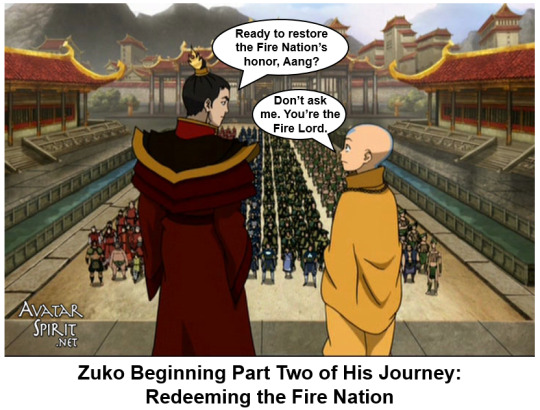
The True Ending of Avatar
The ending for Avatar was not Aang and Katara kissing in Ba Sing Se in front of a beautiful sunset followed by the word “The End”.
No, the true ending of Avatar was Zuko’s coronation. That was the moment when you knew the Gaang had accomplished their goals, that their journey was complete and that the Avatar world had changed for good; the Fire Nation’s war was over and Zuko was the Fire Lord who was going to restore the honor of the Fire Nation...
... Going to. He had not done it yet by the show’s end.
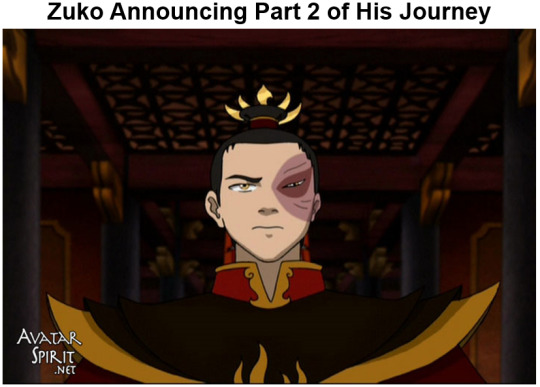
Zuko: “I promised my Uncle that I would restore the honor of the Fire Nation, and I will.”
“And I will”... Will. It was a new goal that hadn’t been achieved and you can bet your butt it wasn’t over three months later. Now read the next lines:
Zuko: “The road ahead of us is challenging. A hundred years of fighting has left the world scarred and divided. But with the Avatar's help, we can get it back on the right path, and begin a new era of love and peace.”
The road ahead is “challenging”. “Get it back” on the right path. “Begin” a new era of love and peace.
Restore the honor of the Fire Nation... A Goal.
Begin a new era of love and peace... A Motivation.
The road ahead is challenging... A Conflict.
These are the beginnings of an entirely new story for the franchise; a logical continuation of the original cast that does not erase the significance of what came before. It is the continuation of Zuko’s stated Goals and Motivations at the end of the show where he must change and grow in order to become the Fire Lord that redeems the Fire Nation.
It is the beginning of the second half of Zuko’s journey.
Where Aang’s Journey Ends, Zuko’s Endures
Aang’s journey in the show consists of a single, clear goal with a definite endgame: master all four elements and defeat the Fire Lord. Once Aang masters all four elements, he is ready to face the Fire Lord. Once he defeats the Fire Lord, his journey is over. How he masters all four elements and defeats the Fire Lord, along with the people he meets along the way, is what makes the story deep and compelling. This is where Zuko comes in.
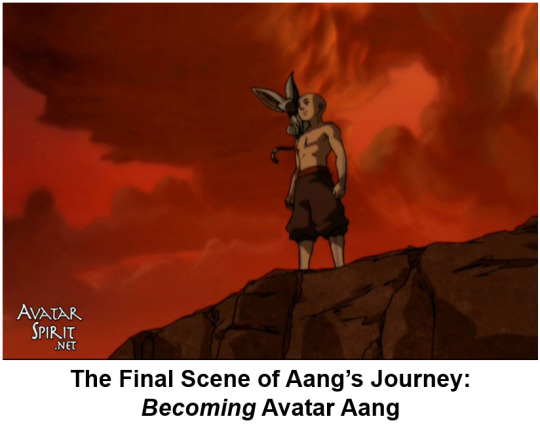
The purpose of Zuko’s journey wasn’t clear for over half of the show. Until Iroh spelled it out for him in Avatar and the Fire Lord, it appeared he was a morally ambiguous wild card who could end up on either side. Why Zuko’s inner turmoil was so important to Aang’s journey was not clear.
Indeed, we did not know the full importance of Zuko’s journey until he stood up to his father in Day of Black Sun. That’s when learned why Zuko was important: he was the crown prince abandoning the evil ways of his country to help the Avatar save the world.
So you’d think that when Zuko helped Aang master firebending, defeated his sister in the Agni Kai and was crowned Fire Lord that his journey was over, right? That being crowned Fire Lord was Zuko’s reward for being a sensitive, gentle soul unlike the ruthless, warmongering norm in his family?
That he’d spend the rest of his days slowly coping with his trauma while enjoying endless, relaxing days of romantic bliss with Mai? That he wouldn’t face internal opposition from the diehards and stalwarts of the old regime? That from the start of his reign he would be leading a Fire Nation that was fully accepting of him and everything he stood for… Right?
Wrong.
The Tragedy of the Fire Nation
In addition to the central conflict of ending the Hundred Year War and Aang’s need to defeat the Fire Lord, there were numerous subtle threads running through the show that gave Avatar its heart and soul: the tragic, lasting effects of war on a people and their culture, the effects of foisting too much responsibility on children, the importance of friendship and having people to lean on, among many others. One of these threads concerned the topic of how decent, normal people can turn bad.
In Season 1, it is revealed that Avatar Roku—a firebender—was a respectable, honorable Avatar despite being a member of the Fire Nation.
In the same season, a Fire Sage helps Aang in his effort to connect with Roku despite being loyal to the Fire Nation and Fire Lord and Avatar.
Aang: “If this is the Avatar's temple, why did the Sages attack me?”
Shyu: “Things have changed. In the past, the Sages were loyal only to the Avatar. When Roku died, the Sages eagerly awaited for the next Avatar to return. But he never came.”
In The Blue Spirit, Aang laments to Zuko how one of his best friends was Fire Nation and says to his enemy, “Do you think we could have been friends, too?”

A Fire Nation admiral and firebending master—Jeong Jeong—deserts out of disillusionment with the war.
And Iroh fights Zhao to stop him from destroying the Moon Spirit, to which Zhao does agree, for a moment, until his temper gets the better of him, showing that concern for harmony and balance isn’t a lost concept in the Fire Nation; it’s just buried deep.
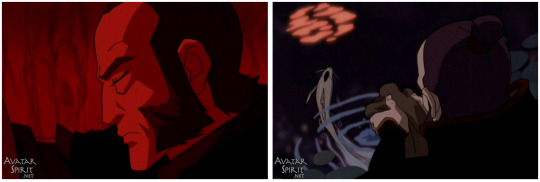
In Season 2, Aang rescues the child of Omashu’s occupying governor, ignoring the practical advantages of keeping it as a hostage, and we are explicitly shown how happy this makes the invaders.
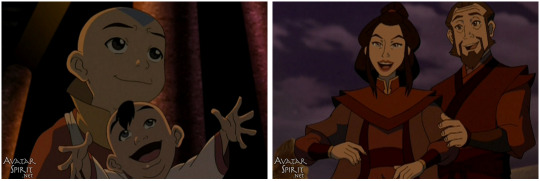
In Zuko Alone, Zuko becomes a truly sympathetic character. We are shown how he has always struggled to live up to the expectations of his warmongering family, and leading up to Season 2’s finale, Zuko and Irohs’ disillusionment with their country reaches new heights, showing that the militaristic expectations of the Fire Nation isn’t even embraced by all members of its ruling family.
In Season 3, the Gaang lives in the Fire Nation. We see Fire Nation people, their kids, their towns, their daily lives. Aang is actually excited to be in the Fire Nation because it reminds him how much fun it was before the war.

In Avatar and the Fire Lord, Roku is shown to have been the best friend of the Fire Lord that started the war, but Sozin’s desire and willpower to achieve his goals corrupted him, and in that same episode, Aang comments that friendships can transcend lifetimes, suggesting that the Avatar and the Fire Lord can be friends again. Ultimately, this is proven true when Zuko joins the Gaang, helps them stop the war and becomes friends with Aang.

Toph: “It's like these people are born bad.”
Aang: “No, that's wrong. I don't think that was the point of what Roku showed me at all. Roku was just as much Fire Nation as Sozin was, right? If anything, their story proves anyone's capable of great good and great evil. Everyone, even the Fire Lord and the Fire Nation have to be treated like they're worth giving a chance. And I also think it was about friendships.”
Everyone, even the Fire Lord and Fire Nation, have to be treated like they’re worth giving a chance. Even if they don’t ask for it.
But most importantly, at the start of every episode, Katara says the Four Nations used to live together in harmony.
What the show was saying in so many small ways was that the Fire Nation’s war and what its leaders had become were neither normal for the Avatar world nor for the Fire Nation itself. Not even Chin the Conqueror’s conquests of the Earth Kingdom holds a candle to the Fire Nation’s multiple layers of evil, self-interest and disregard for world balance. It was a world first, even for the Fire Nation.
While the existence of the all-powerful Avatar, in theory, helps keep the peace between the four nations, the Fire Nation did not used to be hostile to the other nations. Sozin changed the old Fire Nation, the one that was peaceful and enlightened, that achieved an unprecedented era of prosperity, that convinced Sozin that the Fire Nation was first among equals. The fun, friendly Fire Nation that Aang remembered was lost and it stayed lost for a hundred years…
… And the solution wasn’t to destroy the Fire Nation.
The True Purpose of Zuko’s Journey
Until the series finale, Zuko’s journey appeared to be about him achieving moral redemption for his time spent as a halfhearted, incompetent, semi-accomplice in his nation’s evils. But Zuko did not turn against his father and help the Avatar in order to redeem himself of his sins. No, he turned against his country because he was alienated from it, couldn’t meet its expectations and became disillusioned with its goals. In other words, because it was what Uncle Iroh had taught him.
Zuko’s heart told him that betraying Iroh in Ba Sing Se was wrong and that he needed to right that wrong. To Zuko, doing the right thing meant following Uncle Iroh’s guidance and accepting him as his true father, and to do that required switching sides. Zuko’s redemption was not achieved when he stood up to his father. It was not achieved when he stood victorious over Azula. It wasn’t even achieved when he became Fire Lord at the end of the show. Zuko’s redemption was when Iroh hugged and forgave him. That was the moment of catharsis for Zuko. That was his “redemptive” moment.
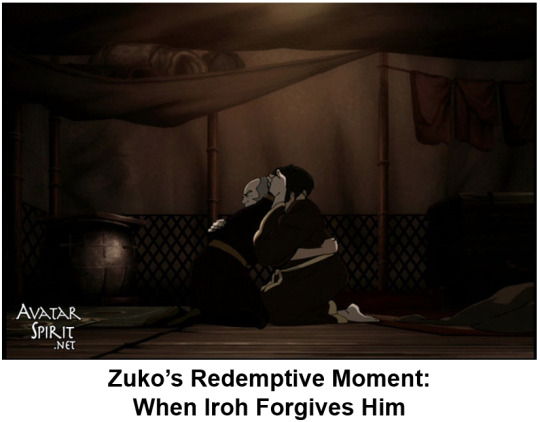
Zuko wasn’t redeemed when he showed people he was “good” or “righteous” or “honorable”. Zuko was redeemed when he felt accepted as a son... By his uncle.
Unfortunately, Zuko’s troubles were deeper than his banishment and Agni Kai with his father. In short, he simply didn’t belong in the Fire Nation he was born into.
Zuko was a normal boy born into an abnormal situation that he didn’t have the personality for. He didn’t have the ruthlessness, intelligence, competence, precociousness and raw talent for militarism and totalitarian rule that his sister had, so he failed to live up to his father’s self-serving, power hungry expectations which, in turn, represented the peak of malice, moral corruption and ruling-through-fear that the war had instilled in the country’s leadership.
In fact, Zuko also didn’t live up to the expectations of his country, as revealed by his monologue in Siege of the North Part 2.

Zuko: “She's a firebending prodigy – and everyone adores her.”
Hmm. I wonder who “everybody” is...?
If you think the Fire Nation’s militarism is simply the result of genetic predispositions, I encourage you to read The East Asian Origins of the Fire Nation and Its Villains. It helps shed light on the potential reasons why a “soft” boy like Zuko might struggle in a militaristic culture such as the Fire Nation’s.
So when Zuko finally realized the righteous path and followed it, his story was over, right? He stood up to his father and Iroh forgave him. He showed us that he had a pure heart and was a good person and good, moral people are supposed to be rewarded for their innate qualities, right? What only mattered to Zuko’s journey was that he help the Avatar, vanquish his sister and end the war by royal decree so that a new era of love and peace could begin… Right?
Wrong again. Iroh even says so when he tells Zuko that his journey is not over when they are together in the White Lotus camp in The Phoenix King:
Iroh: “… Someone new must take the throne. An idealist with a pure heart and unquestionable honor. It has to be you, Prince Zuko… And only you can restore the honor of the Fire Nation.”
Until that moment, Zuko had no visions of himself as the ruler of his country, never mind changing anything about it.
Let me repeat that.
Until THAT MOMENT Zuko had no visions of himself as the ruler of his country.
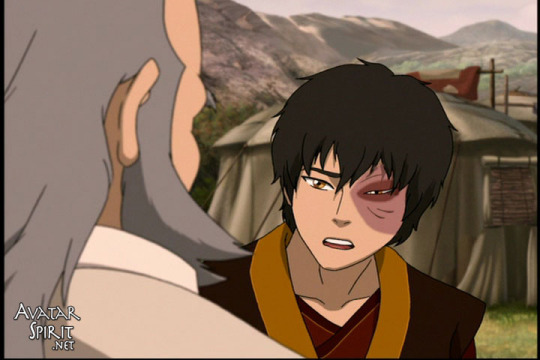
Zuko: “And then... then would you come and take your rightful place on the throne?... I'll try, Uncle.”
Very reassuring words from somebody who believes they’re destiny is to rule a country full of walking flamethrowers. Not. Once more, I encourage you to read The East Asian Origins of the Fire Nation and Its Villains for insight as to why this could go wrong.
To Zuko, the Fire Nation he grew up in is the Fire Nation. As he understood it, his father had to be eliminated, the airships destroyed and the rest of the world defended from what remained of the Fire Nation’s power. Him taking the throne was an afterthought at that point, never mind what to do about his sister.
Perhaps he thought that stopping his father and helping Aang become a fully-realized Avatar would be enough to intimidate Azula and the rest of his country into submission since there did not appear to be a plan to militarily dominate the Fire Nation. However, that’s a topic for another day.
Whatever Zuko thought his endgame was, he didn’t know it, but Iroh knew it. Avatar Roku knew it. The White Lotus knew it and Aang came to know it. Zuko’s journey was not to prove that he is a good person on the inside. It was not to turn against the Fire Nation. It was not to teach Aang firebending. It wasn’t even to defeat his sister and assume the crown. Those were all just means to his journey’s end. Zuko’s journey was, and always has been, to be the Fire Lord that redeems the Fire Nation.
And it wasn’t over when the final credits rolled.
The Two Halves of Zuko’s Journey
Zuko’s journey could be thought of as having two parts. Part one is in the show. It is where Zuko learns why the Fire Nation needs to change and what he needs to do to change it: help Aang, subjugate Azula and become Fire Lord. Part two would be the trials and tribulations that result in the Fire Nation’s redemption, or at least the key events that set it firmly on that path.
Redeeming the Fire Nation, however, is not a process solved by merely wearing the Fire Lord’s crown. It is not enough for him to have a pure heart and have unquestionable honor. He has to make the right choices and answer the hard questions when it comes to weening his country off of war, conquest, colonies and a massive military industry, to say nothing of the culture that supports it.
If “everyone adores” Azula, is everyone going to adore him?
He has to reform the members of the old regime: the generals, admirals, soldiers, nobles and true believers. He has to get the people who are resentful of him on his side. This is not a simple, good versus evil, 3 months later having tea in Ba Sing Se kind of problem. Do you really think Zuko is going to hold mass executions, imprison families and burn books like certain Chinese emperors of old? Or will his “pure heart” and “unquestionable honor” collide with the realities of the post-war Fire Nation?
Will the broken, anemic state of the Royal Family be important? Without old-man Iroh, the ruling family is just him, himself and himself. Will Azula’s ability to create heirs be left to shrivel to dust in the asylum? Ew! Gross!! But that’s a question Zuko has to ask; that’s how power is transferred in his government, and at the end of the show, it’s only him.
Will he even try to get Azula on his side? Does he need Azula on his side? If so, for what purpose? What role will his mother play in the government? Can he simply allow Iroh to be a “multinational agent” via the White Lotus? Will he have to force Iroh to put the Fire Nation first? Will the nobility and military see the state of the Royal Family as a weakness that must be fixed... Or be replaced?
Who will oppose Zuko? Who will follow him? What mistakes will he make? What will he get right?
How will Zuko struggle, how will he change and grow in order to become the Fire Lord that redeems the Fire Nation?
If you thought the reward for finishing hard work is not having more hard work to do, then you’re probably not an adult.
That is the unfinished second half of Zuko’s journey, that we didn’t get to see.

But don’t worry; the hard work ahead for Zuko is the basis for Season 4.
307 notes
·
View notes
Text
Is Cho Chang a Racist Stereotype? - [2] Her House
Another very long post (this time Confucius comes to say hello). My thoughts are under the cut.
Once again, this isn’t a JKR discussion. This is my 2nd post on whether I think it’s fair to call Cho Chang a racist stereotype. The 1st one is here.
My short answer is still no.
Another critique I’ve seen of Cho Chang’s portrayal is that she was a Ravenclaw, which fit into the “smart Asian” stereotype.
But what, exactly, is “Ravenclaw smart” and “Asian smart”? I think it’s worth investigating. Intelligence comes in many forms, and the allegation would only be valid if the two kinds of “smart” are equivalent.
Here’s what the books and JKR, via Pottermore, have said about “Ravenclaw smart”:
“if you've a ready mind,
Where those of wit and learning,
Will always find their kind;”
“Wit beyond measure is man’s greatest treasure.”
“…our people are the most individual – some might even call them eccentrics. But geniuses are often out of step with ordinary folk…”
"Most of the greatest wizarding inventors and innovators were in our house…”
The day-to-day illustration of “Ravenclaw smart” was the answering of riddles to enter the common room. A good answer was “well-reasoned”, and it was known that the door would refuse to open until such an answer was provided, which sometimes led to long discussions outside the common room by the locked-out students. Another manifestation of “Ravenclaw smart” was described as going “full-nerd” on a subject that wasn’t necessarily practical or popular (ovomancy was the example given on Pottermore).
Since “wit” was such a heavily used word in Ravenclaw’s description, I looked up its definition as well.
* Intelligence and the ability to think quickly (Cambridge dictionary)
* Mental sharpness and inventiveness; keen intelligence; a natural aptitude for using words and ideas in a quick and inventive way to create humour (Google)
* The ability to relate seemingly disparate things so as to illuminate or amuse (Merriam Webster)
* Wit is the ability to use words or ideas in an amusing, clever, and imaginative way. (Collins)
My understanding of “Ravenclaw smart” from this info is: the ability to connect dots freely and nimbly. Social norms and expectations are noted, but happily disregarded if they get in the way. “Ravenclaw smart” is by nature argumentative and open-ended. It expects the dot-connecting to lead to places, but doesn’t have a specific place in mind; all endpoints are valid and welcomed as long as they’re logically sound. The strength of “Ravenclaw smart” is it leads to revolutionary innovations; its tendency to unbridle itself from social needs and expectations, however, can lead to amoral/immoral behaviour (Lockhart). The wisdom from “Ravenclaw smart” is also in danger of being ignored or misunderstood when its owner makes insufficient effort to make it comprehensible, or accessible to others (Luna, and likely, Rowena Ravenclaw.)
Those who’ve studied under an East Asian education system (especially in the 90s), or those who’re familiar with those systems, probably know by now where this discussion is leading to.
“Ravenclaw smart” isn’t “Asian smart”. It’s … about the opposite of Asian smart.
What is “Asian smart”? Outside this discussion, any kind of intelligence. But here, I’ll restrict it to the kind of smartness that leads to the racist allegation, the kind of Westerners typically associate with East Asian students (such as Cho Chang, who, for the sake of simplicity, I’ll assume is Chinese from this point on; however, the arguments will likely still stand if she was, for example, Korean, for reasons that will be clear later on). The kind of smartness that is good at math, that gets the highest scores in exams and seems to understand everything. Never asks questions, never makes trouble.
"Asian smart” sounds great. But what if I suggest the following “dark sides” to it?
1) Good at math: with practice, lower level maths are likely to require the least reasoning among school subjects, with their unambiguous, close-ended answers. A child who has done 7x9 enough times no longer need to calculate or think through the logic of their answer. They write down what they’ve memorised by repetition — 63 — and get full score.
2) High scorer: does everything as told. Prioritise the wishes of authority (teachers, parents) above everything else.
3) Seems to understand everything, never asks questions: views knowledge as “model answers” to be regurgitated in exams. Whether it makes sense doesn’t matter.
These are very cynical takes, aren’t they? I’ve cast in these students in a very negative light.
But what if this negative light isn’t negative at all if these students have stayed in the land of their ancestors? What if these “cynical takes” were considered virtues for the budding Chinese scholars of old?
What if “Asian smart” is purely a consequence of history and culture?
First of all, if you ask “Asian smart” students and they’re honest with you, most would tell you that their smartness isn’t the product of miracles or extra brain juice. Some would say it’s not even intelligence. It is the direct result of extra hours spent at the desk.
What is their motivation? Are Chinese children simply born to be extra hardworking?
Perhaps it’s their so-called “tiger moms”? If then, are Chinese moms born more … feline?
The answers, as you may expect, are no, Chinese aren’t born any different from other races. Their drive to study can largely be explained by an ancient, nation-wide exam system known as the imperial examination system (Ke-Ju, 科舉), plus a dude with a name of Confucius.
Many are aware that Chinese have long considered scholastic aptitude as important. But how long is long? The answer: 1.4 millennia. The imperial examination system, or Ke-Ju, began in 605 AD and while the system had evolved over time, the gist of it was this: students participated in locals exams and the “winners” moved up to the county, then provincial levels etc, until the students who’d won all previous exams sat for the final one in the capital palace, at times proctored by the Emperor, where the grand winners would be decided. The Ke-Ju system was essential in shaping Chinese’s attitude towards academic achievements, because the final top 3 winners, regardless of birth, would be hired by the Imperial Court (+ in some cases, get to marry a princess!).
Ancient Chinese studied and studied and studied for that reason; Ke-Ju was one of the very few social ladders available to commoners, who mostly lived in poverty. The Chinese folklore-scape has therefore been filled with “inspirational” stories about how people overcame exceptionally challenging studying conditions (like this one) to become successful in some way.
How, exactly, does Ke-Ju shape the traditional Chinese view towards studying and education?
1) Historically, Chinese views studying as a means to a better life. The pursuit of knowledge was secondary. The modern analogy to studying hard in ancient China is working three part-time jobs to pay the mortgage for a house, and there is, in fact, a famous Chinese idiom that reflects this: 書中自有黃金屋 (“In the books, there is a golden house”). According to the poem (勸學詩) where the idiom came from (written by an Emperor, by the way: 宋真宗, ~ 1000 BCE), other things found in books included high wages paid in food, beauties, chariots and horses. All practical stuff.
2) Because of 1), getting high scores, or “winning” the exams, was seen as the paramount goal of studying. Far less emphasis was put on understanding the exam material. The teachers of ancient Chinese schools (私塾) were known for doing little explaining; instead, they made recite passages and expected them to figure out the meanings by themselves later. The attitude that scores are everything was further fuelled by the fact that the Emperor had the final say on the result of Ke-Ju — the Emperor who’d most probably claimed the throne by genetics and was not always the most intelligent or knowledgable. While the ability to formulate well-researched and well-reasoned answers helped tremendously, the most important skill for the final Ke-Ju winner was, therefore, the ability to guess what the Emperor wanted to hear, and sometimes, what they wanted to see (there were instances where the Emperor swapped the rankings because they found the original victor too ugly).
ie. The most important skill was to know the Emperor’s Answer, and to be able to frame it as the winner’s own perspective even if the winner didn’t, in reality, believe in a single word of it.
3) The tradition of having an “Emperor’s Answer” means its modern equivalent, having an “one and only” model answer, have remained the norm in education systems in many Chinese-speaking communities. Many educators have asked for reforms, argued that model answers discourage independent thinking and creativity, but teachers have also been trained on model answers and they’re often unsure of their own opinions, and at times, fearful that they’ll pass on a “wrong” perspective to their students. The latter is especially true in places under authoritarian rule, where school lessons must follow closely the regime’s propaganda (which can be vastly different from year to year).
You may wonder then: but certainly, the students would revolt. How could children learn in such a stifling environment for so long?
This is where Confucius (孔丘, 551-478 BC) comes in. The education system is only a slice of a culture where authority is not to be questioned, where silence is seen as a virtue even among the youngest of children.
Many may know Confucius to be a philosopher, but he was also a political advisor and not a very popular one. I’ve half-jokingly summed up his slogan as “Make China Great Again”, as he lamented his era for having lost the social etiquette and order of several centuries before, and he was set on bringing them back. He researched on rites and rituals that were already old for his time, postulating that every detail of how people behaved around each other would affect social harmony. Social order, he believed, could be achieved by people respecting and obeying their elders, not only in their thoughts but also in their day-to-day behaviour, which was to be bound with a set of intricate rules that dictated their word choices, actions and even postures according to the situation and kinship between the interacting individuals (a fun video here showing a Confucian rite, including the sheer variety of Confucian bows). The elders would, in return, take care of those with less authority than they had, share with them their wisdom.
Confucius also believed that harmony of the world could be achieved by self-discipline from the base level of the society to the top. In this “discipline pyramid”, individuals sat at the bottom. The discipline of families came above it, in which elder generations of each family reined in the rebellious younger ones, made each family a true unit where its members were unified in thoughts and actions. The nation (government) then exerted its authority on families and cured their conflicts — to drive this point home, the term 父母官 has remained in use in China today, which likens the government officials (官) to parents (父母) and constituents to children who should listen to their parents (imagine someone likening Boris Johnson, or Donald Trump, as your father). Finally, the world, with the Emperor as its ruler, smothers the insurgences among nations to achieve the ultimate order and harmony. (修身、齊家、治國、平天下).
Confucius did put a big asterisk in his theory. For this “discipline pyramid” to work, the asterisk said, the Emperor who’d establish the final world order must be a good one. The problem was: most Emperors thought they were pretty good. Confucius’ philosophy appealed to them because the Emperor sat at the pinnacle of this power structure, and as each level ruled over the one below, the lowest level — the individual commoners — had so many constraints piled on them that their individuality was stripped. This made governing much easier.
And so, while Confucius’ political theories were not particularly popular during his lifetime, Confucianism became the official school of philosophy for Chinese imperial courts after ~100 BC. China’s immense power in the ancient world meant Confucianism also became the prominent school of philosophy in its sphere of influence, which included, among others, the modern nations of Japan, S. Korea and Vietnam, all of which also held their own versions of Ke-Ju.
(Hence, this post would very likely remain valid if Cho Chang was Korean.)
In addition to locating talents among commoners, the Ke-Ju system further cemented Confucianism as the “proper” school of thought because it required the students to learn Confucian texts. These students, who would also become disseminators of knowledge outside the Imperial Court, would bring Confucianism to the commoners who’d practise it as well, as a display of cultured upbringing, in the hopes that their descendants would one day know it well enough to enter the Imperial Court. The discipline pyramid soon infiltrated every aspect of Chinese culture, and Confucianism became Imperial China’s tool for reinforcing social hierarchy and a social stabilizer. It remained revered in all levels of the Chinese society until, during the Cultural Revolution (1966-76), the Red Guards, with the blessings of Mao Ze-Dong, made an all out-attack on Confucian values and while remnants of them have survived in China’s social fabric, they’re largely in tatters (As a result, the best places to observe the legacy of Confucianism nowadays are in Japan, S. Korea and Taiwan.)
Back to the “Asian smart”. “Asian smart” was an impression built from students who were (children of) recent immigrants from Confucianism-influenced communities. Students who’d been educated in the tradition of those who’d sat in the ancient schools, their backs ramrod straight and spoken only when called, their mouths opening only to satisfy the teachers’ requests because teachers were the authority in the classroom and never to be questioned. Students who’d expected an Emperor’s Answer to every exam question, the answer that was, always, the final word. Students who’d studied hard because golden houses could be found in the books.
This “Asian smart” is as different as can be from “Ravenclaw smart”. Asian smart is quiet and unquestioning, while Ravenclaw smart challenges and argues. Asian smart views knowledge as a servant of society, while Ravenclaw smart sees knowledge, and the pursuit thereof, as lording over social expectations. Asian smart is about reinforcing social order while Ravenclaw smart is about breaking the mould. Asian smart has groomed the establishment for over a thousand years while Ravenclaw smart has nurtured eccentrics.
Of note, this disparity between the two “smarts” doesn’t mean one is superior to another. Our current pandemic has made a case for Confucian collectivism; individuals in E. Asian countries have shown themselves to be more willing to sacrifice personal freedoms and aesthetics for the sake of their communities, more comfortable at obeying new rules despite the questions of their need have yet be answered satisfactorily by science, and the benefits of these attitudes have been reflected in the case and death counts. The pandemic has also reminded us of the importance of knowledge that serves society (for example, epidemiological research, vaccine development, contact tracing), even if it’s not always the most exciting. Healthcare is a discipline that requires a “no ifs and buts, no matter how well-reasoned” attitude towards certain rules (how to put on and remove PPEs, for example).
Anyway, I digressed! The conclusion I have, after so many words, is this: Cho Chang being assigned Ravenclaw isn’t racist stereotyping, as some have alleged. I can appreciate where the allegation comes from. The common association with intelligence aside, many sorting tests have also tied academic achievements to Ravenclaw, even though Ravenclaws were never described as book smart in the series. But the allegation doesn’t hold up well after an investigation into the way Ravenclaw House was written, and the kind of smartness Cho Chang was expected to have if it was, indeed, race-based.
It doesn’t mean, I’d like to note, that some Asians aren’t being unfairly judged because parts of our society still hold the false impression that our racial group are somehow born to excel in academics or any work where maths are involved. I understand—I truly do—the frustrations of having one’s accomplishments belittled, attributed to a quirk in the DNA that doesn’t exist. I’ve, too, had to certify that my Mom is 100% human, free of the tiger too many times.
But the HP books cannot be blamed for that, and the longer the blame is placed on something that doesn’t deserve it, the longer the focus, and effort is shifted away from the actual problem and its potential solutions. The time and words spent on such “call-outs” can be better spent, I believe, by explaining how the misconception of “smart Asians” can affect real people like you and me.
And like Cho Chang, perhaps, if we love to think about the HP world. If her classmates wondered why she wasn’t the top of her class for her year, why she wasn’t famously book-smart like Hermione Granger to win them some house points. Why did she sign up for Quidditch? Why would any Asian, never mind a tiny, fragile E. Asian girl like her, even think about touching sports? Shouldn’t she be studying? Learning advanced arithmancy even though their OWLS were still a year away?
And Cho would come back to the common room hours later, flushed with sweat and smiling, and announced that she’d made seeker.
67 notes
·
View notes
Text
Diary of an Emotional Masochist, Chapter One: Dignity and Shame
I am an emotional masochist. I’m the kind of person, who, when I’m already going through a bout of nostalgic melancholy, will decide to read old journal entries or look through old photographs. The kind of person who, when it’s three a.m. and I can’t sleep because I’m thinking about what loves have come and gone (to borrow a phrase from Edna St. Vincent Millay), will get up and Google search those loves. I am the kind of woman who, when I’m already sad, will listen to an album that devastates me. I have a long list of albums that it’s almost too painful to listen to, albums that remind me of such specific times in my life that listening to them takes me right back to where I was then. A different person would purge their record collection and iTunes library of such albums, but, like I said – I am an emotional masochist. On lonesome evenings, after a couple glasses of whiskey, nothing sounds better to me than spinning one of those records (or queueing up one of those playlists). This is one of those lonesome-whiskey evenings, so won’t you join me in indulging? We’re listening to Crooked Fingers’ Dignity and Shame.
From the first sparse, haunting notes of “Islero,” I am transported back in time to the summer of 2005. God, that summer. That terrible, wonderful summer. I’d fucked up my life the year before, and I thought that would be the summer I’d fix it, except all I did was fuck it up even more. God, that summer. That March, I moved away from Chicago after living there for five years. I planned on moving to Milwaukee come autumn, to start fresh in a fresh town. In the meantime, I moved back in with my parents. I wasn’t home, much. Nights, after work, I went to one of the two bars in Kenosha where all my sad drunk hoodlum friends hung out. On days off, I walked in the woods – the heat was relentless, and the canopy of trees offered cool green comfort. Or I drove to Chicago to see shows and drink with my friends and try to remember why I’d left; drove to Milwaukee to scope out neighborhoods, sit for hours at the Hi-Fi Cafe, go record and dress shopping. On one of my record shopping expeditions, I bought Dignity and Shame. It was on the Staff Recommendations shelf, and I liked the cover art, so I took it home with me – and it was serendipity, it was exactly the album I needed at the time.
As soon as I got home, I set it spinning on my turntable, and the first track – “Islero” – gave me goosebumps. The second track – “Weary Arms” – made me cry. It had sad cellos and a lonesome cowboy guitar, and Eric Bachmann’s voice was a raspy baritone: Beware of strangers knocking at your door. Old lovers, too. Don’t think for one second they’ve forgotten you. Oh, oh, oh. By the time the final, hidden track played, I’d melted into a puddle of tears and goosebumps on my bedroom floor. The album destroyed me, and it spooked me because so many of the stories sounded like things right out of my life, both from that year and six or so years before it. It was like Eric Bachmann had read my diary and set it to music. I wanted to write him a letter and say: “Get out of my head, god damn it! Get out of my aching heart.” It’s impossible for me to write about Dignity and Shame, or about the summer of 2005, without descending into hyperbole, sentimental poetry, and melodrama. My God, that summer was hyperbole, sentimental poetry, and melodrama. I was still young enough that it was acceptable to feel things that intensely, acceptable to talk about a sunrise over Lake Michigan by saying things like: “When the light shot through the horizon in streaks of peach and gold, it was the most god damn beautiful thing I’d ever seen.” Dear diary, listen to me.
My “Weary Arms” wrapped tight around so many lovers, that summer – four of them, plus a handful of brief flings. Later that year, I lamented that I hadn’t had as many wild love affairs as I’d had in years past, which, yes, says something unflattering about me. And Eric Bachmann sang: You have many enemies, for reasons no one’s certain of.
One night, while I sat at one of the bars and waited for my friends to arrive, a girl approached me. I didn’t know her, but she knew me. She sat down across from me and lambasted me for sleeping with a guy she’d been dating at the time…two years before. She called me a slut, and some worse things. I wanted to buy her a drink, to appease her. I couldn’t understand why she hated me so much. When I slept with that guy, I had no idea he had a girlfriend. So many enemies, so many lovers, but could a jaded girl like me heed an uptempo “Call To Love?” In that song, Eric took the role of a particular one of my lovers, and said: Won’t you hear my heart? I’m transmitting a call to love. On a night when the moon was orange-red and luminous, that lover said: “The moon is the color of your hair.” Another night: “You were born in the wrong era, Jess.” And, though I was a sucker for sentimental poetry, my guard was up. Lara Meyerratken answered for me: Don’t need my heart kicked ‘round the block no more. You may be smooth-talking, daddy, but I’ve heard it all before. I traded gossip with the “Twilight Creeps.” In this sweet-sad song with the bright piano and the shimmering backup vocals, I was both the singer and the sung about. I could have sung it to one of my lovers, should have said to her: Flower, don’t dig so deep so you don’t go anywhere. But the words were also about me: You say someday you’re gonna float away. Take yourself some kind of holiday. I often told my sad drunk hoodlum friends, the twilight creeps, that I needed to get the hell out of town. “If I could just get gone for more than a few days, go somewhere more than a few hours away…there ain’t no use in trying to make me stay.”
My lovers all wanted to make me stay. The flower-girl, I’ll call her Valerie. The one who spoke poetic words to me, I’ll call him Jack. And there was Lon, and Carmine. In different ways, for different reasons, they each wanted me to choose them over all the rest. Even a few of the week-long flings and one-night stands, older punk guys or younger hippie girls, said things to me like: “How did I get so lucky as to meet a girl like you?” Or: “So, are you my girlfriend now?” And when I said no, they called me a heartbreaker. A “Destroyer.” It’s a woebegone cowboy of a tune. Doleful drums, piano that tinkles like ice cubes in a bar glass, and a lap steel guitar – which, as far as I’m concerned, is the aural equivalent of an anti-hero walking off into the sunset. The song is all about how the singer is going to make someone his, and then he’s going to leave them behind. When they called me heartbreaker, I wanted to sing it: Lay down, just let it come, and resign your heart, today, to get blown away. “Valerie,” well, that’s why I’m referring to that lover as Valerie. Much like me, she was a punk rock girl turned heroine of a Tom Waits song (heroine of a Crooked Fingers song). She had thriftstore dresses and jailhouse tattoos and self-inflicted scars. “Valerie,” the song, has a sanguine strut, is a besotted love song, and I thought of Valerie, the girl: Red roses, silk, you in your sleek summer dress. You were light, revelation, oh, I love you the best. But she and I kept our love unspoken. We both had other romantic complications, and only touched each other on long hot nights after too many bottles of wine and too many pills. “Sleep All Summer” was my song for Jack, the young ex-goth whose mouth was pink and pouty like he’d been sucking on a strawberry popsicle. Our love was either all the good songs and kissing ’til our lips were raw, or it was screaming matches and hangover headaches. What bliss is this, and then he’d get attention-starved and whiny, and I’d burn hot and cold and say nasty things, and we’d say: “This is it, we’re through.” But – There ain’t no way we’re gonna find another, the way we sleep all summer. Why won’t you fall back in love with me? And we’d run into each other at the bar, and faster than our friends could say I told you so we’d be tangled up in the backseat of his car or rolling around by the lake, and the whole thing would start all over again. He’d play the martyr, and I’d say: I would change for you, but babe, that doesn’t mean I’m gonna be a better man.
And “Coldways” kill cool lovers. Lon was a folk singer from the north woods. He’d been one of my best friends for years already, and when we started dating I was so tired of complicated, fiery relationships that I mistook comfort for True Love. My heart still hurts when I think of how I hurt him. He wanted me to marry him and I just wanted to be drunk and in love, to listen to “Coldways”’s thrumming, swelling sound. To sing along: Come out, come on, tonight the city’s alive. “Wrecking Ball” has a jaunty, punchdrunk piano, and the piano had been drinking, but so had I. God, I drank so much that summer. On the rare night I spent at home, I holed up in my room, wrote long, sad, tales of people in the legend of my life, and drank blackberry brandy mixed with Sprite. Something like that would taste over-sweet to me now, make me shudder, but maybe the same part of me that craved sentimental poetry also thirsted for sugary drinks. And most nights, I wasn’t at home. Most nights, I changed clothes in my car after work. I swapped my reeking-of-pizza button down shirt and black slacks for one of my vintage dresses. A mint green confection, or a pink and white sundress. Something from the ‘50s, blue with red and white polka dots, or a slinky black number that a ‘30s jazz singer would have worn. And I sat at one of two bars, drank whiskey and Coke, or brandy old-fashioneds, or gin and tonics all night long. I waited for my friends to arrive, and I drank and smoked and entertained myself with one of the items I always had in my bag – a book of poetry by Dorothy Parker or Edna St. Vincent Millay, a deck of Alice In Wonderland tarot cards. And sometimes, someone would find me intriguing. I swear, I wasn’t a Manic Pixie Dream Girl, but… I was a redhead in a retro dress (usually with a strand of fake pearls, too) sitting in a dive bar, smoking pastel-colored cigarettes, reading sonnets and tarot cards. Christ. Often, someone found me intriguing, chatted me up, and I wound up with yet another lover. I was a destroyer, destroying myself with booze and love. I was a wrecking ball. Eric Bachmann, accompanied by that barroom piano, sang: And you laughed and you danced, and it let you feel fine for a while. Hanging out with the kids who you knew soon would fall out of style.
I’ve left two songs out, dear diary. I did it on purpose, because they are the two that hurt the most. They are also the two that heal the most. The kind of songs that make me weep, then tell me to dry my tears. “You Must Build A Fire,” oh, it is one of the saddest songs. It begins with only two guitars (a finger-picked lead and that god damn lap steel again), and Eric’s voice is so plaintive, sounds like it’s about to crack, and he sings: Oh, gracious love, you were so kind to me. You only broke my heart, let my arms and legs stay strong. So I could swim upon the open sea, searching for another love. Floating along aimlessly. I haven’t told you about Carmine, yet. Carmine was a musician who looked like a magician from an old-time carnival. The year before, he’d ruined me in a worse way than any other lover ever had. (As a friend put it, he was one of the ones who fucked me up so bad I was pretty much ruined for anyone else.) He ruined me, but I let him back into my life. That summer, we got together. It was supposed to be closure, but of course it just opened everything up again. He said: “I want to be with you. I want to try again.” I said: “Okay, yes, let’s start over. I want to be with you.” He said: “Only if you break things off with all your other lovers. I want to be your only.” The nerve, giving me an ultimatum like that when he was even more of a notorious libertine than I was. And the song sang: I had someone, a love I thought was true. But sometimes you just get tired, and you must try not to die. And give your love, though no one may receive. You must build a giant fire, for the whole wide world to see. It sounded like that whole heartbroken, hot summer. Oh, where are you, love?
The title track, “Dignity and Shame,” is a piano ballad that told me: To be sure, there ain’t no cure. There could be no one to save you. It is the track I return to over and over, more than any other track on the album. Though my life has calmed down a lot in the decade since that summer, sometimes – that feeling comes, you’ve been here once before. That wicked feeling you don’t want to feel no more. And then, Eric Bachmann (get out my head, god damn it!) sings: You’re not the same as the day that you came. You can choose dignity, or shame.
I choose dignity. I carry my broken heart like a torch in the night. Little keeper of light, burning deep, burning bright in the dark.
[originally appeared in Witchsong in October 2015]
#jessie lynn mcmains#my writing#music#memoir#crooked fingers#dignity and shame#2015#2005#love#lovers#heartbreak#panic attacks#drugs#alcohol#lyrics#this is still one of my favorite pieces of music writing i've ever written#and since witchsong has gone dark i thought i'd share it here
15 notes
·
View notes
Text
happy birthday, frank tashlin!

today would have been frank tashlin’s 107th birthday, making him the second youngest director on the WB staff (bob clampett getting the title of youngest, born less than 3 months after tashlin) frank tashlin’s one of my favorite WB directors, and it’s a criminal shame how underrated he is!
he began his cartoonist career in 1930 working for john foster’s aesop’s fables, then briefly migrating to van beuren studios, but he seldom stayed in one place too long. bob clampett once likened him to a yo-yo, and ink and paint girl martha sigall reminiscing “here today, gone tomorrow. now you see him, now you don’t.” he joined the schlesinger gang in 1933 as an animator, even receiving a credit for buddy’s beer garden as tish tash.

during his first (out of three) stint at warner bros, he was running a comic on the side — van boring (he never says a word), a play on his former boss van beuren. leon schlesinger was particularly enamored by the comic, and wanted “a cut of it.” tash responded warmly, recounting “i said go to hell. so he fired me.”
he moved to ub iwerks’ studio in 1934, briefly working as an animator, and later moving to hal roach’s studio as a gag man. he returned to warner bros in 1936, this time as a director. jack king had just returned to disney, and a spot needed to be filled. evidently there were no harsh feelings between schlesinger and tash, as tash claimed “he was a man who thought in money terms. he never let personalities interfere too long; his wallet spoke.”

his first directed cartoon was porky’s poultry plant in 1936, also noteworthy for being the debut of composer carl stalling as well, who would stay at the studio for 22 years. tashlin started off as just a looney tunes director—tex avery was splitting the difference between looney tunes and merrie melodies, whereas friz freleng was exclusively MM. however, tash also got to indulge in the merrie melodies (a privilege his predecessor jack king never got to experience), his first being speaking of the weather in 1937, a take on the classic “books come to life” genre made popular by the harman-ising era. tashlin himself even said he idolized the duo, and modestly dismissed his own takes as “cribbing their ideas.” during his first directorial stint from 1936-1938, tash would direct 13 looney tunes and 8 merrie melodies.

tashlin departed in 1938 after an argument with studio executive henry binder, and sought refuge at disney. there, he recounts forming a union because of how terrible the pay was (he said that he earned $150 a week at warner bros, and at disney he supposed he “was the first person [in the union] making more than thirty dollars a week.” he wrote mickey and the beanstalk and was also involved in very early development of lady and the tramp.

he left disney after an argument with mr. disney himself (“i always pick the wrong people to fight with”) and headed for columbia pictures’ screen gems in 1941. in fact, he was put in charge of the studio impromptu when a “man” fired everyone but him. he hired a number of picketers during the infamous animator’s strike. he made the fox and the crow series, one of the studio’s better entires. and, once more, he was fired after a dispute with an executive.
tashlin finally returned to warner bros in 1943, taking over norm mccabe’s unit. not to say that his 1936-1938 works were bad (he has quite a few masterpieces--porky’s romance, the case of the stuttering pig, wholly smoke, cracked ice… some of his merrie melodies certainly rival tex avery’s), but his period from 1943-1946 reflects his experience and knowledge acquired from his days drifting between studios.
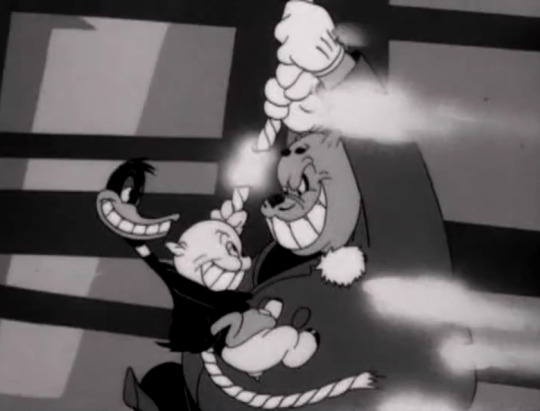
his first picture from his return was porky pig’s feat, one of my favorite porky/daffy cartoons and probably one of the best black and white cartoons made at the studio, if not the best. the plot is simple: porky and daffy stay at a fancy shmancy hotel, and the bill is ridiculously expensive. porky assures the manager daffy’s cashing in the check, and we see daffy gambling away (and losing) all of their money. the rest of the cartoon consists of daffy and porky attempting to save their hides and escape the hotel, but they end up being held prisoner regardless. bugs bunny also makes a cameo as another jailbird who tried (and failed) the same shtick they did.

tashlin lamented about being demoted back to the porky cartoons again: “who wants to see the damned pig, and i’m stuck with the damned pig. it takes him so long to talk.” “i hated him, i thought he was a terrible character.” he mentions envying the other directors working with bugs (only directing 2 bugs cartoons himself), how the studio worked as a hierarchy of sorts. having to work your way up to the big leagues. though his porky cartoons are fantastic, his distaste is subtly noted. (he claims that “you couldn't do anything with his body”, which i couldn’t disagree with more) daffy takes the front seat in porky pig’s feat, brother brat is dedicated exclusively to porky getting abused by a testosterone fueled baby, and swooner crooner hardly features porky to begin with (an iconic cartoon that holds the title as the only porky cartoon nominated for an academy award.) nevertheless, his cartoons are stronger than ever, growing only more powerful with his daffy entries and eventually bugs entries.
a big contributor to the success of these cartoons lies in tashlin’s filmmaking aspirations. he’d leave warner bros in 1944 (his cartoons running all the way until 1946) to go to the film business. ever since porky’s poultry plant, his eye for camera angles and cinematography has been evident, and only grown stronger since. tashlin described how his mindset aligned with his drifter attitude. if he was working on cartoons, he was thinking of film. if he was working in film, he was thinking of plays, etc.

he began as a gag writer for films featuring big names such as the marx brothers and lucille ball. he directed films all through the 50s and 60s, echoing elements he mastered in his animation: elaborate camera angles, fast pace, sight gags, plot twists, etc.
i’ve run my mouth enough, but he was a great guy who’s criminally underrated. his cartoons are hilarious, artful, clever, and just plain fun. definitely an important name in the animation business that should be much more important! i’ll get more in depth with his content once i get to his cartoons for my reviews (soon!)

to end, left to right: frank tashlin, tex avery, henry binder, leon schlesinger, ray katz, and friz freleng in 1936.
happy birthday, tish tash!
36 notes
·
View notes
Text
bbc merlin favorites!
RATED G
All is Semblative by Whitefox (G)
“Cinderella, Merlin-style. Somehow, not AU. Or crack.”
10608 words
Sharing is Caring by platonic_boner (G)
“Arthur hadn’t really given his soulmate much thought, until he beat a peasant with a broomstick and every blow hurt like he was hitting himself.”
6080 words
About Time by rosewatergold (G)
“After losing Arthur, Merlin semi-accidentally travels back in time. In an attempt to change the future, Merlin takes Morgana under his wing and trains her in magic...”
55018 words
Gentle, Gentle by Polomonkey (G)
“Merlin’s fed up and Arthur accidentally de-aging himself to an eleven year old is the last straw.”
4382 words
Prince Brat by pepperlandgirl4 (G)
“Some sort of evil spell makes Arthur revert back to 6 years old.”
3 chapters, 14562 words
In a Name by StarlightInHerEyes22 (G)
“In the middle of some quest or another, Merlin, Arthur, and the knights find themselves stuck in the middle of a shrine....they need only to speak their true names and titles.”
2541 words
The Game of Lying by CastleScribe (G)
“It’s just Merlin’s luck to get trapped in a castle with the knights and a crazy fae who wants to see how well he can lie.”
7262 words
RATED T
If We’d Kissed in High School by gh0strobin (T)
“Modern AU where Merlin is a florist.”
6394 words
Visiting Hunith by RurouniHime (T)
“Five times Ealdor had visitors.”
8984 words
Made of Dreams and Bones by lady_ragnell (T)
“Arthur would have starved that first winter, if it weren’t for Hunith and her son.”
7476 words
Linger On Your Pale Blue Eyes by supercalvin (T)
“The body of a Prince was not like anyone’s. His hand only ever held others in a firm handshake, and rarely without gloves.”
18979 words
Laundry’s Hard Work by supercalvin (T)
“Wasn’t Merlin supposed to be...tiny? When the hell had he learned to use a sword and not fall on his backside?”
4094 words
Fathom Me Out by supercalvin (T) [sequel to Laundry’s Hard Work!]
“After ten years, Arthur thinks he has Merlin all figured out. But as he watches Merlin, he finds out that he has more questions than answers.”
21860 words
To the Syntax of Things by suntipped (T)
“Arthur/Merlin, first kiss in the toilet of the school. Denial as usual.”
20171 words
Dying to Return by StormDancer (T)
“When they try to hang him, he floats. They put him on the pyre at dawn. He doesn’t burn.”
19869 words
In Drunkenness and in Sobriety by Palebluedot (T)
“The one where Arthur gets drunk again, but Merlin doesn’t mind so much this time.”
3318 words
Five Kisses by kianspo (T)
“The first time Merlin kisses him, completely out of the blue, Arthur is not at all concerned.”
3042 words
Neither fish nor fowl by adelagia (T)
“Trusses of flowers, personalized letters and whole roast chickens had always been sure-fire ways to win a person’s heart...Merlin’s heart, however, was an entirely different story.”
11266 words
RATED E/M
My Place is With You by tehfanglyfish (E)
“Not long after Arthur takes the throne, Merlin increasingly finds himself sharing a bed with the king.”
15681 words
The King’s Lament by vintagelilacs (E)
“Once again Arthur couldn’t help drawing comparisons between Merlin and the stable boy.”
13319 words
Take Me Apart by vintagelilacs (E)
“Arthur really can take Merlin apart with one blow.”
2533 words
Physician’s Hands by SassyWarlock (E) [need an AO3 account to read!]
“Well, you know what they say about men who wear big gauntlets.”
7738 words
Denial, Anger, Bargaining, Depression, Acceptance by Mellacita (E)
“Merlin goes to retrieve his father’s body and take it to Ealdor for a proper funeral. Arthur tails him.”
11402 words
A Modern Manservant by Mamalazzer (E)
“A modern magical comedy very loosely based on Ugly Betty. Publishing king Uther Pendragon has had enough of his playboy son...”
2 chapters, 112645 words
Favorite by astolat (E)
“Arthur was tipped back against the wall, his mouth open for breath and staring....trying to work out how it could possibly be that good with Merlin, of all people.”
13012 words
Chrysalis by i_canz_kill_dragon (E)
Merlin, a “totally comfortable heterosexual” must have nothing to fear from highly out Arthur Pendragon, right?
34749 words
For Want of Wreckage by bloodsongs (E)
“When a druid clan visits Camelot to forge an alliance, they offer Arthur a protective rune tattoo as a diplomatic gift.”
26521 words
After The Heart Goes by Polomonkey (M)
“Merlin grows up in care, and it breaks him. Then he meets Arthur, who wants to put him back together.”
2 chapters, 40483 words
You Are Mine (And I Am Yours) by vintagelilacs (M)
“Merlin’s eyes latched onto his. Arthur felt flayed bare under that unremitting blue gaze.”
2054 words
Wrong-Footed by Moonshoes_Potter (M)
“Arthur doesn’t realize what an absolute pillow princess he is.”
3141 words
all oak and iron bound by numinousnumbat (M)
“Some of those born with magic are repelled by iron. Merlin wishes he knew how much iron there was in Camelot before he started his new life there.”
8218 words
Ignorance is Bliss by RoughDraftHero (M)
“Cue complete mortification and/or anger when Merlin discovers he’s been having it with Arthur Pendragon, CEO of Pendragon, Ltd, his ultimate boss.”
10758 words
All I Want by Elveatas (Ricecake) (M) [remix of Make My Wish Come True (M) in canon era]
“It doesn’t happen often that Arthur takes Merlin to bed, but it’s happened enough times that it’s become a bad habit.”
3878 words
269 notes
·
View notes
Photo



The Bringer of Spring and a Second Camelot
“I feel like there is no need for conversation
Some questions are better left without a reason
And I would rather reveal myself than my situation
Now and then I consider my hesitation
The more the light shines through me
I pretend to close my eyes
The more the dark consumes me
I pretend I’m burning, burning bright
I wonder if the the things I did were just to be different
To spare myself from the shame of my existence
And I would surely redeem myself in my desperation
Here and now I express my situation ...
There is nothing ever wrong but nothing’s ever right
Such a cruel contradiction
I know I crossed the line,
it is not easy to define
I am born to indecision
There’s always something new,
some path I’m supposed to choose
With no particular rhyme or reason …” - Burnging Bright sung by Shinedown
Henry VIII is the prince charming who was a champion of Humanist education and values. To the people, he was their chosen king. From their view, his father was the winter, he was the spring. Yet, as it has been endlessly pointed out, Henry VII had a damn good reason for being paranoid and the losses he experienced at the end of his reign, led to his somber personality.
Henry VIII also represented what was once sung about his late elder brother, Prince Arthur Tudor of Wales: The union of House Lancaster and House York to create something entirely new. This marvel was pushed by the design created during his father’s reign that Henry VIII and (later) his son and daughters continued to push. It was a representation of the Tudor Dynasty as the bringer of peace and a new age of peace and justice. But while people began to doubt this narrative at the end of his reign, they were entirely convinced of it with the accession of their handsome new overlord, Henry VIII.
But we all know how the story turns out. Who knows if Henry VIII would not have broken away from Rome had Catherine of Aragon’s firstborn son lived, or if they had more than one living son. That is a question we will never be fully able to respond without jumping through the same paradoxical loopholes the Tudors and the Plantagenets before them jumped through to justify their reigns. What can be said with near absolute certainty is that Henry VIII’s reign showed a lot of promise. He was man who knew how to talk to people rather than talk down to them. While he saw himself above his peers -as every King did- he didn’t find the common people repulsive, and preferred to be around new men than the old aristocracy. Furthermore, for better and for worse, Henry’s policies, both during before the break of Rome and after it, benefited the rising gentry. Which is what makes his fall from grace, in many of his peers, including the commons who once cried out in joy at his joint coronation with Catherine of Aragon, all the more lamentable.
From the stereotypical hero of every Disney-fied fairy tale to a villain to the Catholic Church and some of his subjects, and tyrant to others; Henry’s life feels like one constant battle against his biggest enemy: himself.
Henry was not meant to be King, but he behaved as if he was. He had big shoes to fill, and being a student of history and theology, he was anxious to fulfill everyone’s expectations, including his own. He did not want to outright condemn his father’s harsh policies at the end of his reign, but he couldn’t condone them either. Eager to build his new reign on the love and affirmation from ALL of his subjects, he gave them justice (which was nothing more than blood sport). The commons rise up in anger, with nobles and would-be usurpers use them to undermine a king’s goverment many times in English history. The people felt wronged and were out for blood and Henry delivered them two scapegoats: his father’s tax collectors, Empson and Dudley.
We will never fully understand Henry’s psyche. Much less since he is a figure of a bygone era. The past, as one author put it, is an alien land. But judging from the actions in the beginning of his reigh, a clearer picture starts to emerge.
2 notes
·
View notes
Text
The Rush Fish-Eye Lens: Bastille Day, The Opening Salvo in the War for Creative Freedom

“Why should a man be scorned if, finding himself in prison, he tries to get out and go home? Or if, when he cannot do so, he thinks and talks about other topics than jailers and prison-walls? The world outside has not become less real because the prisoner cannot see it. In using escape in this way the critics have chosen the wrong word, and, what is more, they are confusing, not always by sincere error, the Escape of the Prisoner with the Flight of the Deserter.” –J.R.R. Tolkien from “On Fairy-Stories” (1939)

In 1958, Harvard economist John Kenneth Galbraith published “The Affluent Society” describing a postwar era’s achievements in manufacturing and distribution, and the growing dominance of America’s corporations (Coca-Cola, Kodak, GM, Ford, Levi’s, Exxon, I.T.T., Holiday Inn, McDonald’s, etc.). Accordingly, the valiant G.I. “Greatest” Generation returned from their heroic battles anxious to establish their own modest kingdoms within the new neighborhoods built by William Levitt, himself another enterprising G.I. entrepreneur developing a formidable institution called suburbia. The homogeneity resulting from FDR’s mobilization of American Nationalism to overcome external threats and economic depression became the modus operandi of those seeking to make the “American Dream” reality at war’s end.

This embrace of conformity would not be universally shared however. Far from celebrating achievement, the intent of Galbraith’s report instead was to draw attention to widening economic disparity. For her part, political activist Malvina Reynolds communicated her sanctimony for this ticky-tacky uniformity in her 1962 song, “Little Boxes.”
youtube
Likewise, the children born into this suburban Utopia, The Boomers, would grow increasingly antsy, seeking any and every means to escape the cohering values of their Veteran parents, voiced their rebellious views at every opportunity. The “turn on, tune in, drop out” generation embraced and explored escapism in the arts, their self-directed lifestyles, exercise (aerobics, biking, martial arts, disco dancing, roller skating, sexuality), Transcendental Meditation, and recreational drug use (LSD, marijuana).
Reflecting this escapist strain, this era produced multiple expressions of Fantastic Neomedievalism. In 1966, the Society for Creative Anachronism was formed, dedicated to representing life in the pre-modern Medieval Era, donning appropriate wardrobe, engaging in physical activities such as archery, and reviving Medieval dance. 1974 witnessed the publication of the RPG Dungeons & Dragons. Monty Python’s zany telling of King Arthur, Monty Python and the Holy Grail premiered in 1975.

The animated interpretation of J.R.R. Tolkein’s The Hobbit was released in 1977. And also in 1977, Star Wars made a debut evoking knighthood order and the John Campbell-inspired hero’s journey archetypes.

Music similarly embraced Elizabethan Era themes with Jethro Tull’s Minstrel In The Valley (1975) and the Led Zeppelin masterwork, “Stairway To Heaven” (1971). Zeppelin created lyrics that were inspired by Robert Plant’s Arthurian search for spiritual perfection, and contains references to May Queens, pipers, and "bustling hedgerows.” The track even uses a Elizabethan recorder consort.

In July of 1975, RUSH, having just been awarded a Juno Award for “Most Promising Group” anxiously entered the recording studios to begin their follow-up project to the successful Fly By Night album and tour. For Caress of Steel, their chosen direction likewise channeled escapist Fantastic Neomedievalism and embraced Progressive Rock conceptualization in epic musical storytelling. Typically youthful inclinations of separating themselves from their formative suburban upbringing was fully imagined in a side long, six song cycle called “The Fountain of Lamenth” where an arduous search for their Holy Grail led them to also a typically inconclusive ending. Another long track featured the Tolkein Necromancer as the subject of their composition, in addition to making the image the focus of their album cover. This artwork marked the first with long-time RUSH cover artist, Hugh Syme.

With the benefit of hindsight, we in 2020 can place this particular album into context of that time with a clearer understanding of these ambitious musicians. Often the notable anecdote of RUSH’s introduction of this freshly recorded material to their touring partner, Paul Stanley of KISS, where he tacitly stared nonplussed at the floor and uncomfortably listened to their insular musings is revisited when describing their collaboration still in an early phase. Unfortunately, lagging record sales support their own self-deprecation when referring to their lamentation of these abstract experiments, as did the dwindling crowds at remote locations on a tour that they have since dubbed the “Down the Tubes” tour. We must remember that these were merely 22 year olds who were nerds at heart. KISS’s Gene Simmons still expresses his disbelief when telling tales of engaging in his own and numerous notorious tour conquests while walking past a hotel room where RUSH in stark contrast were immersed reading novels. Although Geddy Lee does admit that they themselves may have been too high when recording Caress of Steel.

Nonetheless, the opening track of this album was a bombastic one that can now be understood as a bold statement of defiance, daring, and determination. “Bastille Day” expresses the march towards their own revolution. Certainly, they were not going to allow “kings” to determine the course of their collaboration. They were seeking to “free the dungeons of the innocent” and to never again “bow to the king.” RUSH was given notice by their business representatives that either they adjust to commercial demands or they’re label support would be terminated. Unwilling to surrender their ideals to The Priests of the music industry, RUSH pushed back and “assumed control.”
Terminat hora diem; terminat auctor opus
youtube
#RUSH#Caress of Steel#j.r.r. tolkien#Nathan Santos#Kenneth Galbraith#malvina reynolds#monty python and the holy grail#fantastic neomedievalism
7 notes
·
View notes
Text
Major Gintama spoilers ahead. Decided to share my thoughts since I feel people are missing the point on why some of us are not happy with the current developments, especially when we are looking at the bigger picture, not just a snapshot. A few folks have already and wonderfully articulated their thoughts that I agree with, so this is my two cents to add. No one has to agree with me. I’ve been a Gintama fan for a very, very long time. I will always love this series, but no series is perfect, and having a different viewpoint about the present events does not make me or anyone else less of a fan.
Death in general always brings a mixture of emotions, and people are allowed to mourn, to question, to do what they need to do in order to process somebody’s last farewell (just don’t harass people if they feel differently than you do). You are not required to be 100% positive or negative about the story’s progression. Different opinions on this chapter can and do exist. I’m sharing mine only because I want to clear up some misconceptions about why those of us with the same thoughts feel as we do.
We are not necessarily unhappy that Takasugi died (although this does not make us jump for joy, either). We were prepared to accept Takasugi living or dying, depending on the manner in which either fate was carried out. Indeed, his death mirrors history with the real Takasugi also dying young. His death brings to mind Gintoki’s words to Oboro: “Be it killing him or protecting him, they’re both my job.” Takasugi’s death has been foreshadowed more than once, particularly with his first appearance post-time skip and the revelation of borrowed time, so it’s not a surprise when it’s been quite apparent. We know this. Lastly, some of us, like myself, are fine with the death scene itself (Takasugi dying in Gintoki’s arms) because it was beautifully done.
We’re unhappy that the final arc post-time skip consisted of rehashed events that have already taken place multiple times (even in a movie). We’re unhappy that Katsura, who originally said, “I can’t let you cut down your master again,” is denied the chance to be present for these final moments when he’s also a student of Shouka Sonjuku, having experienced the same loss. We’re unhappy that Matako and Henpeita – who have now lost more of their closest comrades – were denied the chance to fight alongside Takasugi just as everyone else was allowed to rush forward and fight with Gintoki. We’re unhappy that Shouyou had to be reminded once again that he could not save a single one of his cherished students. We’re unhappy that Takasugi had to stab himself again, compounding his trauma, as if Utsuro bringing him to the brink of death countless times was not enough. We’re unhappy that in a cruel and twisted way, Gintoki saves his teacher but loses his friend, whom he had already protected multiple times, body and soul. We’re unhappy that Gintoki is reliving that choice, that pain—again, and again, and again.
No, happiness doesn’t always prevail in life. Everyone knows this. But we’re talking about a fictional story whose final arc is one we feel could’ve been set up differently. And there is nothing wrong with expressing a variety of opinions about it.
I’m not a fan of endless tragedy and violence with little to no substance. To me, it felt like Takasugi had become a vehicle for violence. “How much more can I shock the audience and get away with it?” That’s the impression I received. Consequently, these last few chapters have come off as rather uninspired to me, especially when several pages were centered on everyone simply running around or running after people, and repeating the same one-liners and sentiments they have expressed countless times already. It’s not as if we’ve forgotten or have never seen how much the cast cares for one another. Gintama’s past arcs have given us high standards already, so we had different expectations for the finale.
This is partly why I wasn’t fully on board with Nobu Nobu’s death, even though his death flag was obvious, too. It felt like the easy way out, because then he wouldn’t live on to deal with the consequences of his actions, wouldn’t have to work hard to change what he had caused. It’s harder to live on with such a burden, to find a new path in life, and to earn back people’s respect and trust, but how much greater a message that would’ve been. Killing off your antagonists immediately after redeeming them also has the risk of becoming a cliché as much as surviving does.
However, I accepted it because even though Gintama isn’t mirroring history detail for detail (for one thing, Okita would’ve died instead of his sister), it still does with the passing of the Edo to Meiji era, Amanto parallels with the Perry Expedition, the end of the Tokugawa Shogunate, the Western influences, and more. Nobu Nobu’s death and the rise of a new government within Gintama’s world made that much clear.
It can also be said that chapter 703 emphasizes the fact that you can still move on after a great loss. But, as far as lessons go, we have already learned this through Shige Shige’s death with little time spent on the fact that Zenzou had to kill a friend to save a friend, and lost that friend in the end, anyway. Yet, he returned to assist in the battle against Utsuro. Zenzou has exemplified moving on from a terrible tragedy; we have seen the lesson in action already, and, truly, Zenzou has amazing inner strength. I was sad that Shige Shige had to die after all that because he is a good man, but I liked the plot and character development his death resulted in.
Takasugi had his redemption already, and his entire story arc was well done and even his death is memorable, as redundant as the circumstances turned out to be, but I would expect nothing less, for he deserves to go out with a bang. He has directly and indirectly caused many deaths as much as any other antagonist in the story, but he has also saved many lives through his later actions. Had he lived, I wouldn’t expect him to feel he must spend the rest of his life atoning for his actions, because he did not see himself on the “wrong side” so much as he did the government. Politics is a complex matter, which is why Gintama has always focused on one’s reaction to their circumstances and polishing their soul to silver, not whether they’re politically right or wrong.
Rather, if chosen to survive, I think Takasugi would have tried to find his own way to live in the new world while being a product of the old one. Yes, he held onto his grief and rage for far too long, but he was also driven to change or destroy all the obstacles in his way. Shogun Assassination and Rakuyou arcs showed him renewed by the end. He would have found his way again, just as Shouyou once told him he was capable of doing. And it would’ve been a nice change from dying right after you reconcile with your family or friends. It would’ve been an inspiration for those that live on with great burdens in their past, but can now look forward to a future for once after believing there was no more hope for them in their traumatic lives.
As for living on borrowed time, I’d also hoped that Takasugi would be able to die on his own terms away from the public eye, sharing one last drink with Gintoki, Katsura, Sakamoto, and even Matako and Henpeita. If Sorachi really couldn’t think of anything else to do with him (or the Kiheitai, for that matter) except to kill him off, then at least give Takasugi some final moments of peace with his friends before exiting this world, just like other characters received (whether they died or departed the city). But he was not granted that. Instead, he was subjected to one violent attack after another, used to deliver another fatal injury to himself and cause his teacher more sorrow, and then, finally, cut down by one of his dearest friends. For me, it was nothing but senseless bloodshed.
After reading this convoluted-to-the-utmost-degree finale, I can appreciate that Takasugi at least could die within Gintoki’s arms. It continually reaffirms my belief that Gintoki and Takasugi’s relationship is unbreakable. They know each other so well—too well, perhaps, which is why they were so readily annoyed with one another, too. Gintoki called him “my other self.” Takasugi admitted that hurting Gintoki hurts him more than anything else. They were the original pair of rivals from the beginning. They entrusted earth and space battles to one another, needing no explanation. Gintoki knew Takasugi would come back; Takasugi knew Gintoki would come through in the end. No one understands one another better than they do (except I would venture to include Katsura, and Sakamoto on some level, as one who had met them after Shouyou’s initial capture).
Gintoki wielding both their swords to deliver the final blow to Utsuro, who kept trying to destroy Gintoki while in the throes of death thanks to Takasugi, is a nice touch. Gintoki saying that not even death will break their bond is a lovely sentiment. Takasugi protecting Gintoki in return and paying the ultimate price moves my soul. Takasugi making a joke about his height is well within the spirit of the story. Gintoki saying, “We might have just been born under that star,” makes me smile. Takasugi wanting Gintoki’s smile as his last sight of this world, and Gintoki struggling to keep his tears in check until after Takasugi has left him, breaks my heart.
I’m fine with all of that.
I simply lament the fact that the path leading to the finale, to Takasugi’s death, was not all that I’d expected. I can only hope that like Shige Shige, Takasugi’s death will challenge and change status quo somehow. It has to because it’s such a significant event.
I have issues with the narrative as a whole since Rakuyou arc, but that’ll be too long to get into right now, and I don’t have any desire to write out my thoughts at this point (not enough time, anyway). One of them in a nutshell is this idea that you can’t move on unless your cherished ones return. Sometimes you don’t know when they will and sometimes they don’t. If you’ve built your life around the condition that those people are always there, then you may not have the strength to stand on your own two feet when you have to tackle something on your own. I feel it contradicts one of Gintama’s lessons about building up your inner strength – your soul – so that you can still move forward, even if you must walk alone. Solely relying on others for your happiness, solely making others responsible for your happiness, is not that healthy, in my opinion.
I think Tae and Tsukuyo showed a healthier way of moving forward while hoping for others to return or reunite. They became/resumed being leaders and businesswomen; they reacted to their circumstances and proceeded accordingly with what they felt was best. For Sacchan, Sorachi relied on an old gag; for Kyuubei, Sorachi placed them in a marriage interview situation, as if he couldn’t think of what else to do with them. In the end, Tae was worried for Shinpachi being unable to move on, and Tsukuyo was the one who reassured everyone that Gintoki would eventually come back, and that they would all see him again. Not even Katsura believed that Gintoki had somehow become an enemy of the world; he has always trusted that Gintoki would be on a sure path because Gintoki told him, “If you've got time to fantasize about a beautiful death, why not live beautifully until the end?” So it was strange to me when others expressed their doubts in thinking they’d have to fight Gintoki in order to protect the world.
But, I digress, and I will stop before I lose sight of my original purpose for this post.
Everything that has inspired me before Silver Soul arc will remain. I still think Gintama is one of the best shounen series to date with its myriad of ways to stand out from the rest. Sadly, it just fell short of my expectations at the end, becoming more like a generic shounen story. I don’t know if Sorachi is burnt out; or if his editor(s) were pressuring him to write a certain way; or if he had written himself into corner and this is the result of him trying to get out in a believable way. He has redrawn things before and has admitted he has forgotten details or story elements in the past. It happens to the best of us, and only he knows how his internal process works. Clearly, he’s still trying to end things in the best way he can with what he already presented chapters ago. No one is faulting him for that. It’s not the same as critiquing a story’s entirety on its own.
I will accept Gintama’s impending conclusion, but as I have stated many times in the past, you are always free to question, to challenge, and to even affirm canon material of any text with your opinions. Everyone thinks and feels differently. That is why we study literature; that is why we love stories. I’m eternally thankful to Sorachi for creating Gintama. I will always treasure this series.
I will never forget that Takasugi Shinsuke gave his life for a world he was intent on destroying—and, really, he did destroy it so that it could be renewed. And I hope none of the cast forgets, either.
#gintama spoilers#gintama#takasugi shinsuke#takasugi#spoilers#special shout-out to arirna for our many discussions on this; thank you for everything#this was tiring to type out when i'm still thinking about takasugi#one of my most favourite characters of all time so naturally i'm affected by this chapter#i post this not to generate debate or arguments but just to share#long post
83 notes
·
View notes
Text
FE3H x LoZ Part 2
Hi again! It’s been a while but here are some things I’ve come up with since the last post I sent. I hope you enjoy!
THE CHURCH OF HYLIA
I’m still debating upon whethere there will be a fourth route that focuses on the Church of Hylia, so I won’t touch upon the leader of the Church yet (but if anyone has any ideas, please feel free to bring them up!) The following characters are faculty and staff at the Officer’s Academy, and they are all recruitable.
Byleth - So it’s come to my attention that a huge part of the narrative in Three Houses comes from Byleth. Therefore, I’m going to include Byleth in this AU! It feels kind of wrong especially since this blog has given them so much characterization that I feel they without a doubt belong to Three Houses, but the story needs something to drive it forward (one example being Byleth has to choose a house). Unlike Three Houses, however, there won’t be a super big focus on their origins. Sothis isn’t in this AU, after all, so Byleth will just be a normal mercenary who becomes the new professor by chance. I suppose you could say that Byleth is much more of a Mark than a Corrin here in terms of involvement, though they still can have supports with the other characters. Also, they have pointy ears to match everyone else.
Jeralt - Good news: Jeralt is alive for the story this time! Throughout the story he acts as a source of wisdom for Byleth, and eventually gets closer to the house leader and does that for them, too.
Telma - a healer from Hyrule who serves as a professor and the school physician. She really wants a man, and almost always has some kind of dating problems. However, she is very motherly and excellent at her job. Her favorite hobby is making cocktails (which help her drink her worries away) but she doesn’t make any for the students until post-timeskip. Strengths: Faith, Riding, Authority
Kass - he was a traveling bard in his youth but eventually became a full-time professor. He is known for giving profound yet mysterious advice. He has taken Medli under his wing (pun intended) as a musical apprentice. Strengths: Axe, Flying
Robbie - the training instructor at the Officer’s Academy. Known for his flashy battle moves. He has an interest in tinkering and mechanical work. Possesses close ties to the royal family of Hyrule. Strengths: Sword, Lance, Axe
Orca - a general in the Knights of Hylia. One of the oldest knights. He is strict and has a commanding presence over the other knights, and has risen to his position because of his renowned strategic prowess. Strengths: Sword, Lance, Authority
Linebeck - a rather lazy soldier in the Knights of Hylia. He is often being lectured by for his lack of effort. Has a habit of taking credit for achievements that he didn’t contribute to. Strengths: Sword, Brawl, Heavy Armor
Osfala - a former scholar who is now a field physician in the Knights of Hylia. He is a graduate of the Officer’s Academy. Quite prickly, but very attentive and quick-minded on the battlefield. Strengths: Bow, Faith
Irene - a mage in the Knights of Hylia. She is a graduate of the Officer’s Academy. She is not devout to the Church of Hylia, but she took the job in order to help those in need (though she would never admit it). Strengths: Reason, Flying
Makar - a noble child born out of an affair and taken in as a servant of the Church. He can often be found tending to the greenhouse, his favorite place in the monastery. Somewhat absentminded, but always wants to do his best. Strengths: Lance, Faith, Flying
ROUTES
Before we begin, I’d like to announce that the name of the monastery is the Great Plateau Monastery! It’s named after the plateau it sits on, which is in the center of the continent. Its high cliffs act as a natural barrier against any skirmishes that happen on the borders of the nations.
This is mostly just a general summary of each route rather than going chapter by chapter.
Part 1: Clear Skies
Jeralt and Byleth save three children (Link, Zelda, and Ganondorf) from a bandit attack.
Linebeck arrives on the scene and thanks the mercenaries for their work… because he didn’t have to do anything!
It is revealed that Link, Zelda, and Ganondorf are students at the Officer’s Academy and heirs to their respective nations. Linebeck escorts them, as well as Byleth and Jeralt, back to the Great Plateau Monastery.
The mercenaries are recommended to the Church of Hylia: Jeralt as a Knight and Byleth as a professor. Byleth meets the students and selects a house to teach.
Byleth leads their house on various mock battles and real missions, while also using their status as professor to teach and train their students. The students also bond with one another, even mingling with the other houses – the three house leaders are notably close.
During one mission, Byleth and the students are tasked with protecting the monastery from an army led by an assassin known as Sheik. It is at this point where they begin to suspect that there is a bigger conspiracy at work.
Zelda later reveals that Sheik is a phantom that she controls in order to collect information and lead assaults while maintaining her identity as a student. She accuses the Church of hiding the truth from the world, and before she can elaborate, she escapes.
If Byleth has chosen the Azure Owls, they follow Zelda and she explains that there is a prophecy that has been erased from history by the Church, in which the three nations are caught in an eternal cycle of war and hatred over the Triforce Crests. She has learned that Ganondorf, as the bearer of the Crest of Demise, will wage war that will destroy the continent in the future, and she intends to stop that from happening as soon as possible.
If Byleth has chosen the Azure Owls, they join Zelda and siege the Great Plateau Monastery in order to make it a new base of operations for the Kingdom army. If Byleth has chosen the Crimson Boars or Verdant Wolves, they join their students and the Knights of Hylia in defending the monastery.
Regardless of which house they chose, Byleth is knocked unconscious during the battle, and wakes up five years later. The Kingdom, Empire and Alliance are at war with each other, just as the prophecy stated.
Part 2: Relentless Rain (Azure Owls / Kingdom of Hyrule)
Byleth returns to the monastery, where they reunite with Zelda and the Azure Owls. They learn that the Gerudo Empire has allied with the Church of Hylia – though they have different goals, they both oppose the Kingdom – while the Ordon Alliance remains neutral, but is struggling to prevent internal conflict.
The Gerudo Empire invades Kingdom territory, but to everyone’s surprise the Alliance arrives as well, resulting in a three-way battle. There are heavy losses on all sides, with the Alliance army especially damaged.
Zelda’s first plan of action is to eliminate the Alliance while it is still vulnerable. The Kingdom army storms the Alliance capital and though Link is there as the last line of defense, he surrenders upon defeat.
The Kingdom army continues to advance into Empire territory. The Knights of Hylia guard a vital fortress in one last stand, but are defeated.
Zelda and Byleth arrange a secret meeting with Ganondorf in hopes of obtaining more answers about the prophecy, which Ganondorf has learned about in the past five years. When they confront him, they see how much his mind has deteriorated, and they are ambushed by soldiers of the Yiga Clan. Zelda and Byleth are forced to retreat.
Zelda admits that she had worked with the Yiga Clan as Sheik in the past, partially to obtain information about the resurrection of the Demon King and partially to gain their aid in taking down the Church. However, since their goal is to unleash the Demon King, she plans to target them as well.
The Kingdom army arrives at the capital and sieges the imperial palace. Ganondorf has fully lost his sanity and exhausts all of his troops in order to try and overwhelm Zelda. He is defeated, but in a last-ditch effort he uses his Crest in order to transform into a Demonic Beast, Beast Ganon.
Zelda and Byleth defeat Beast Ganon. Zelda briefly mourns that of all people, the Crest of Demise happened to take hold of her friend. However, she is reassured that she has restored peace to the continent. Link steps down from leadership of the Alliance and becomes a lone traveler. The three nations unify into the Great Kingdom of Hyrule, and Zelda ascends as its first queen. She heralds an era of peace and harmony while turning her attention to tracking down the remains of the Yiga Clan.
Part 2: Roaring Thunder (Crimson Boars / Gerudo Empire)
Byleth returns to the fallen Great Plateau Monastery and encounters Ganondorf, who is continuing to grow unstable. He laments that he hears voices and has visions urging him down the path of evil. The two reunite with the rest of the Crimson Boars and claim the monastery as their base.
Ganondorf forces a sudden battle between the armies of the Empire, Kingdom, and Alliance. All three armies are hit extremely hard.
Link arrives at the monastery alone to talk to Ganondorf as a friend rather than an opponent. He urges Ganondorf to stop the war with him so they can live in peace as they did before. In a fit of blind rage, Ganondorf loses control of his own actions and murders Link.
Ganondorf realizes that he needs to locate the source of the darkness within him before he can cause any more damage. However, he must convince Zelda to stop the war, so the imperial army continues its advance into Kingdom territory.
The rest of the Verdant Wolves lead the Alliance army into battle, desiring vengeance for the murder of their friend and leader. Ganondorf is forced to defeat them in order to advance.
The imperial army arrives at the Kingdom capital, where Zelda faces them in one final stand. She refuses to yield, as she believes that her mission to eliminate Ganondorf is the only way to prevent further conflict. Ganondorf regretfully defeats her, and in her dying breath she says to “beware the eye of the Yiga.”
Byleth and Ganondorf obtain a posthumous letter from Impa, which details all of the information Zelda has collected about the reincarnation cycle, and Ganondorf learns of his true nature as the reborn Demise, the Demon King of ancient history. The Yiga Clan are a cult that seeks to revive Demise and bring forth the apocalypse, and the letter includes directions to their hidden base.
The imperial army storms the Yiga Clan Hideout, but in the chaos Ganondorf is restrained by the Yiga. They use their powers to extract the Crest of Demise from his body, and from the Crest’s power Demise is fully revived.
Byleth and Ganondorf engage in one final battle against the origin of evil itself, the Demon King Demise. Upon defeating him, the curse is broken permanently and Ganondorf is freed from its hold.
Ganondorf takes his rightful place as the King of the Gerudo Empire, and eventually repairs relations with the Kingdom and Alliance. He visits the Great Plateau Monastery, where Link is buried, the day before his coronation, and says a prayer for all of his friends who had fallen in the war. He is renowned centuries into the future as the catalyst who laid the continent’s demons to eternal rest.
Part 2: Shining Sun (Verdant Wolves / Ordon Alliance)
Byleth returns to the Great Plateau Monastery and reunites with Link, who has been hopeful for their return. Together they meet up with the other Verdant Wolves and rally their troops at the monastery, which has become their new base.
SIDE NOTE: in this route, Link has the option to recruit any units who were not recruited in part 1 if he approaches them in battle.
The Alliance army advances into the Kingdom, but are stopped by the Zelda and the Kingdom army. Ganondorf and his troops also arrive, resulting in a three-way battle. All three armies are forced to fall back, and Link decides to travel along the border between the Empire and Kingdom in order to avoid more ambushes.
Link confesses that as a commoner who ascended to leadership, he has always been treated as an outsider. His dream is to rebuild the continent into a place where everyone is treated equally, and where the bigotry and discrimination between social classes and nations is abolished. This is why his goal is to end the war in its entirety and unite all three nations.
The Alliance army is attacked by the Yiga Clan, which is when Byleth and Link first learn of the cult’s existence.
Before departing from the border and heading into Kingdom territory, the Alliance army faces Ganondorf and the imperial army one more time. Cia is particularly conflicted about her loyalties, and if Link recruits her during the battle, Ganondorf calls in reinforcements that surround them completely. Link is forced to defeat Ganondorf in order to proceed, and in Ganondorf’s last moments, Link promises to bring peace to the continent. (Though Link is not aware of the prophecy, he unknowingly fulfilled it by defeating Ganondorf.)
The Alliance battles its way through the Kingdom until it reaches the capital. Zelda refuses to hear Link’s pleas to cease the war, and the Kingdom engages the Alliance in battle. Midway through, she calls upon the Yiga Clan, and they arrive as reinforcements. Byleth and Link are able to endure and come out victorious, defeating both the Kingdom and the Yiga.
Zelda survives, but is exiled out of the continent. The three nations are united into the Hylian Alliance, and Link becomes its first ruler. Link is still upset over losing Zelda and Ganondorf, but makes sure to honor them by making his reign a just and noble one thats brings the Alliance into a golden age. He is remembered as a progressive leader who utilized his kindness and generosity in order to bring together people from all walks of life.
CRESTS
I’ve decided that Crests and Relics are also in this AU! Here are all of the ones that appear in this universe.
There are four crests that are not passed on by bloodline: the Triforce Crests (Din, Nayru, Farore) and the Crest of Demise. These are the oldest Crests; they can manifest in anyone regardless of status, but appear very rarely. The Triforce Crests are capable of manifesting in someone who already has another Crest, and they won’t have any negative effects, unlike what is shown in Three Houses. The Crest of Demise is a different story.
Din - one of the Triforce Crests, also known as the Crest of Power. Its Hero Relic is the Mirror Shield. Bearers: Ganondorf (minor)
Nayru - one of the Triforce Crests, also known as the Crest of Wisdom. Its Hero Relic is the Bow of Light. Bearers: Zelda (minor)
Farore - one of the Triforce Crests, also known as the Crest of Courage. Its Hero Relic is the Master Sword. Bearers: Link (major)
Demise - an ancient Crest named after the Demon King who bore it. Bearers of this Crest eventually lose their sanity and gain an unquenchable bloodlust. Its Hero Relic is the Demon Trident. Bearers: Ganondorf (major)
Hylia - a Crest that is usually found in members of the royal family of Hyrule. Its Hero Relic is the Goddess Sword. Bearers: Zelda (major), Fi (minor)
Nabooru - a Crest that comes from one of the first warrior heroes of the Gerudo Empire. Its Hero Relic is the Scimitar of the Seven. Bearers: Urbosa (minor)
Kakariko - a Crest that originates from Hyrule. Its Hero Relic is the Sahasrahla Staff. Bearers: Osfala (minor), Robbie (minor)
Holodrum - a Crest that originates from Gerudo. Its Hero Relic is the Golden Gauntlets. Bearers: Onox (minor)
Zora - a Crest that originates from Hyrule. Its Hero Relic is the Lightscale Trident. Bearers: Ruto (major), Mipha (minor)
Lokomo - a Crest that originates from Ordon. Its Hero Relic is the Light Force Gem. Bearers: Byrne (minor)
Goron - a Crest that originates from Hyrule. Its Hero Relic is the Boulder Breaker. Bearers: Daruk (minor)
Rito - a Crest that originates from Hyrule. Its Hero Relic is the Harpstring Axe. Bearers: Revali (minor), Medli (minor)
Kokiri - a Crest that originates from Ordon. Its Hero Relic is the Fairy Bow. Bearers: Saria (minor), Makar (minor)
Twili - known in Hyrule as the Interloper’s Crest. The first bearer of this Crest left the continent and founded the kingdom of Twili, and it is only found in members of the Twili royal family. Its Hero Relic is the Twilight Spear. Bearers: Midna (major)
NEW CLASSES
These are some classes that I would’ve liked to see in Three Houses, so I wrote them down because it makes sense for certain characters. Also, the house leaders have their own Lord classes.
Dark Flier - a wyvern rider who uses lances and reason. I imagine this to be Midna’s canon class.
Holy Flier - a pegasus rider who uses axes and faith. I imagine this to be Cia’s and Medli’s canon class.
Blade Scion - an infantry unit who uses swords, lances, and gauntlets. I imagine this to be Impa’s and Groose’s canon class.
Goddess Knight - a horse rider who uses bows and reason. This is Zelda’s advanced class.
Holy Queen - a horse rider who uses bows and reason. This is Zelda’s master class.
Radiant Knight - a horse rider who uses swords and faith. This is Link’s advanced class.
Legendary Hero - a horse rider who uses swords and faith. This is Link’s master class.
King of Thieves - an infantry unit who uses lances, gauntlets, and reason. This is Ganondorf’s advanced class.
Demon King - an infantry unit who uses lances, gauntlets, and reason. This is Ganondorf’s master class and Demise’s only class.
OTHER NOTES
I forgot to mention in my last post that Shad is also a Crest researcher, so he’s basically Linhardt but without the sleepy.
Pre-timeskip, Zelda has shorter (BotW2) hair, Link has a ponytail (BotW), and Ganondorf has short (OoT) hair. Post-timeskip, Zelda has long (BotW) hair, Link has short (TP) hair, and Ganondorf has long (HW) hair.
Zant is Midna’s adoptive brother, so he is from Twili, but not of royal heritage. He hates Midna because she is the true heir to the throne but seemingly takes it for granted and does not take her responsibilities seriously. Upon enrolling at the Officer’s Academy, both of them were members of the Crimson Boars, but Midna transferred to the Verdant Wolves after meeting and befriending Link prior to the events of the story.
The equivalent of the Death Knight is Cherry. Yes, Robbie’s ancient oven Cherry. She can create Ancient Arrows at will, so she’s basically the definition of a scary unit.
I’m in love with the Link’s Awakening remake and I wanted to include Marin in this AU somehow so, so badly, but she’s basically Malon + Medli, so it seems a bit redundant. Just know that I love Marin with my whole heart.
#submission#anon#fire emblem three houses#fe16#legend of zelda#zelda au#WHOOOOO A ZELDA AU UPDATE I WAS SO STOKED TO GET THIS!!!#ok there's many things to yell abt so im going to go in any order#first can i just say i love the attention to detail??? the crests.. hero relics.... the parallels btwn this and 3h's story.... everything#flows and fits so well together and i love it!!#firstly nJERALT IS ALIVE?? I THANK YOU FOR MY ENTIRE L I F E THIS IS ALL IVE EVER WANTED#telma as manuela.... i love telma sm so thi s is golden#and ofc linebeck has to be there!! i love linebeck... imagining his just Showin Up is just so funny asdfsjdfh#also iRENE!! ok i'll stop gushing abt chars now becayse that'll take forever LMAO#great plateau monastery is a lovely name i like it!! also v fitting for the location parallels huehuehue#sheik's used v cleverly n i like it! reminds me of phantom hourglass which is prob what you were aiming for. i totally expected a zelda is#sheik thing a la flame emperor reveal so this totally threw me off nice job#the part 2 names are so good? shining sun... roaring thunder... relentless rain.... i actually like these better than canon fe3h p2 names#and the plots!!!! OH MY GOD. i am so UPSET ganon kIlls link in a fit of raGE??? THANKS FOR SNATCHING MY FEELINGS TONIGHT :(#zelda being exiled is so v bittersweet oof#ganondorf vs demise a la byleth vs nemesis ingame? chefs kiss. i love that cinematic parallel#i was actually thinking abt something along the same lines the other day so our minds anon!! our minds!!!#those crests and new classes??? omg.... i Need to see a blade scion pls.... also demon king... b l ease...#CHERRY AS THE DEATH KNIGHT DSJHSHDF WITH ANCIENT ARROWS??? THATS HILARIOUS BUT ALSO REALLY TERRIFYING.#how do u escape the one who Canonically Creates ancient arrows... you can't..... :o#i cant believe that the ancient materials oven is the death knight dshjdhfhdHDSHDSHjhhjhh HHHHHH#AAAA I NEED TO PLAY THE REMAKE!! but honestly i agree. i love marin with all my heart too#even if she's not in this au i just. Love her. she's there as a seagull maybe or smthn#in conclusion.... this au still has my entire SOUL and HEART. thank you for feeding us once again!!!#i'll add this post to the masterlist huehuehuhe
17 notes
·
View notes